G.O. Sodipo & Co Report
Updated, 4/11/2024
New updates on Report
Firstly, we want to extend our profound appreciation to Jus Mundi for granting us free access to 15 previously inaccessible awards of the 203 Arbitration cases considered in this report. At the time when this Report was initially published in June, the awards in 38 cases were inaccessible, however, with the help of Jus Mundi, we have been able to receive access to 15 additional awards bringing down the number of inaccessible awards to 23.
For ease of reference, below are the changes made in the report:
Previously
As at the time of going to the press, we could not access 38 of the 203 cases considered in the 1974-2024 period. These are cases with restricted access to the ICSID platforms, or details of the award are not in the public domain. 80 cases of the 203 cases were discontinued and 27 are currently pending. Of the 58 cases in which the award was accessible, 36 awards representing 62.06% were in favour of the state party and 22 awards representing 37.9% were in favour of the investor.
Currently
As at the time of going to the press, we could not access 23 of the 203 cases considered in the 1974-2024 period. These are cases with restricted access to the ICSID platforms, or details of the award are not in the public domain. 80 cases of the 203 cases were discontinued and 28 are currently pending. Of the 72 cases in which the award was accessible, 38 awards representing 53% were in favour of the state party and 34 awards representing 47% were in favour of the investor.
Previously
For general context, of the 33 cases in which annulment proceedings were commenced, about a quarter or 25.71%, were discontinued and partial annulment were awarded in two cases. A little less than half or 42.85%, of the Annulment awards were not found or had restricted access. Of the 31.42% that were found, the State party’s request for annulment failed in 63.63% of the cases. The State party’s request for annulment succeeded only in 9% of the cases and the investor’s request for annulment was dismissed 27.27% of the cases which accounts for all the cases investors filed for annulment.
Currently
of the 33 cases in which annulment proceedings were commenced, over a quarter, or 30.3%, were discontinued, and partial annulment was awarded in two cases. 12.1% of the Annulment awards were not found or had restricted access and 2 are currently pending. Of the 51.5% that were accessible, the State party’s request for annulment failed in 52.9% of the cases. The State party’s request for annulment succeeded only in 11.7% of the cases and the investor’s request for annulment was dismissed in 35.2% of the cases which accounts for all the cases investors filed for annulment.
Notably, since our last publication, Comoros now has 1 ACTIVE listed arbitrator on the ICSID Arbitration Panel.
Summarily, there have been no significant changes to the previous findings in our publication but with the aid of the awards accessed, we have been able to render a more precise statistical data on the State of ICSID Arbitration in Africa.
1. 0 African States, Investment Treaty Arbitration and ICSID
This study analyses the investment treaty arbitrations undertaken by or against African states at the International Centre for the Settlement of Investment Disputes (ICSID), in the last fifty years, from 1974 to 2024. ICSID offers dispute resolution by arbitration, conciliation and fact finding. Arbitration is often held out to be a preferred means of dispute resolution by foreign investors who may be wary of settling disputes in the national courts of host states. In recent times, African states appear to be developing a bias against investment treaty arbitration. The bias appears to stem from a variety of reasons. Critics say it may impair the sovereignty of states to penalize or counterclaim against investors who breach human rights, environmental obligations, or anti-corruption laws, as such, some states have revoked or issued revocation notices for Bilateral Investment Treaties (BITS).[1] It is believed that the increase in number of cases instituted against Latin American states and the Awards skewed against the states led to Venezuela, Bolivia and Ecuador withdrawing from ICSID.[2]
This study has three main parts. The first provides a background to ICSID, the involvement of African states to ICSID and investment treaty arbitration. The second part presents the results, the data and offers a very brief analysis of the data. The last part has a very short conclusion that identified the trends and points at the future.
ICSID is the most widely accepted multilateral treaty for the settlement of investment disputes.[3] ICSID was birthed by the International Bank for Reconstruction and Development (World Bank) in 1965 when most African states had not gained independence. 23 of the 35 newly independent African states demonstrated confidence in ICSID by signing the ICSID agreement between March 18, 1965, when it became open for signatures, and October 14, 1966, when it came into force. ICSID offered hope of an increase in foreign direct investments in emerging states that provided guarantees of equitable treatment and protection of investment if the states submitted to a mechanism for arbitration of disputes based on the ICSID treaty.[4]
ICSID arbitration is a common feature in most African states. Many African states have local statutes that provide that the states can be subjected to ICSID arbitration by foreign investors in the event of a dispute.[5] Many African states have signed BITS with other African and non-African states with obligations for ICSID arbitration to resolve disputes. Today, 90.74% of African nations are party to ICSID. Of these, some African states have signed but are yet to ratify ICSID while some have not even signed ICSID. South Africa, Libya, and Equatorial-Guinea are not signatories to the ICSID, but they have bilateral investment treaties that have recourse to ICSID arbitration, and this study shows that the BITS have been invoked against them in ICSID arbitration. Ethiopia, Guinea-Bissau, and Namibia are signatories to ICSID, but they are yet to ratify same. African states have unanimously endorsed investment treaty arbitration by being party to the African Continental Free Trade Agreement (AfCFTA) which has obligations for the settlement of disputes by arbitration to be administered by a regional disputes’ settlement body.[6]
Despite possible perceptions against investment treaty arbitration, the most scientific way to ascertain if there is any justification for the bias by some African states is to examine the statistics of investment treaty arbitration by or against African states. Data analysis can demonstrate if the arguments or perceptions are justifiable in the light of the evidence presented by the statistics. Herein lies the justification for this study. There is a dearth of empirical literature on the results of ICSID arbitration against Africa states.[7] The study highlights the African nations that have had ICSID arbitrations instituted against them and the number of African states that are party to ICSID. Our primary source is the ICSID website.
The study examines a number of issues ranging from the number of ICSID arbitrations that have been instituted against African states, by African states against investors and those instituted by African entities against African states. It reveals that it is not only non-African entities that have instituted ICSID arbitration against African states, as there is a growing number of African investors that have instituted ICSID arbitration against African states. It identifies the nature of the disputes, ranging from construction to leisure, oil and gas and mining, to agri-business. The study identified the cases that have been discontinued because the parties have settled and those that were discontinued because the parties or one of the parties was unable to or refused to pay the requisite fees for arbitration.
The study examines the number of cases where awards were given against African states and compares this to the cases where the award was made against the investor. It analyses cases where African states have successfully and unsuccessfully appealed against the awards. It compares this to situations when investors appealed against the awards in favour of African states. The study examines the type of instruments invoked to initiate ICSID arbitrations ranging from the ICSID treaty, multilateral treaties, BITS and contracts.
The study reviews the diversity of the arbitrators that were appointed comparing African and non-African arbitrators and the gender of the arbitrators. It discusses the challenges arising from the failure of African states from maintaining the names of their nationals or other African persons on the panel of arbitrators from whom African states may chose arbitrators for ICSID arbitrations.
2.0 African States that have had ICSID Arbitration[8]
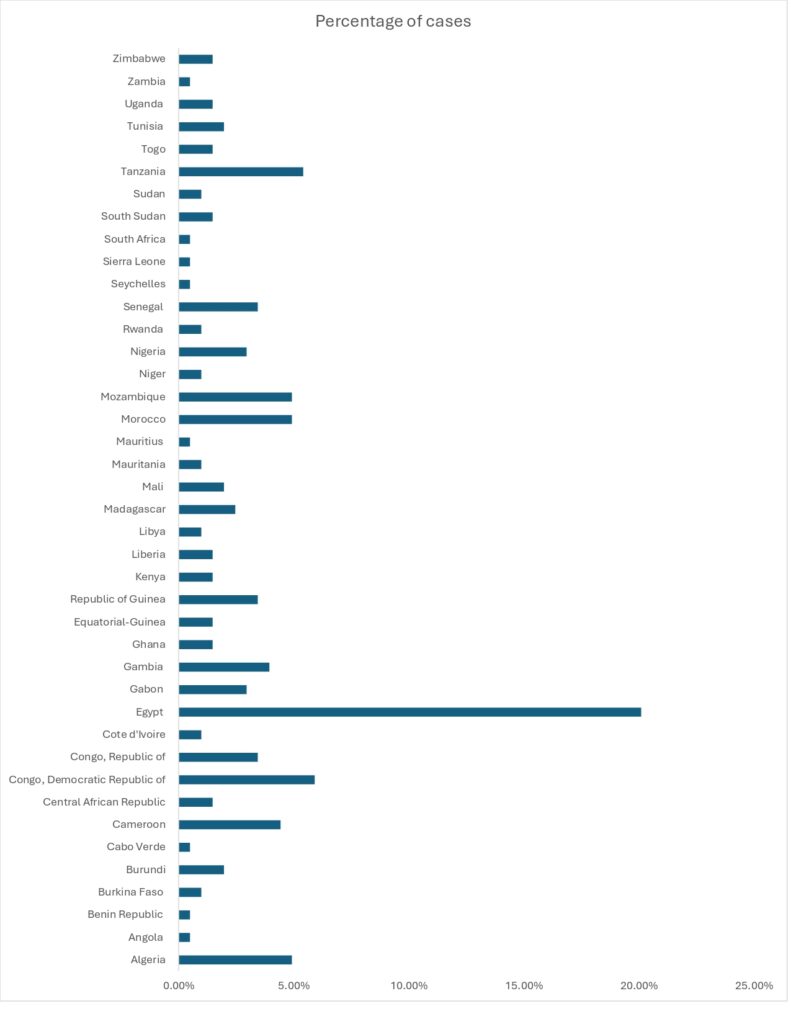
African states that have had ICSID
Figure 1: G.O. Sodipo & co. ICSID Africa Report
As shown in Figure 1, of the 54 countries in Africa, 41 have had ICSID Arbitrations, this represents 75.9% of the countries in Africa. As of April 2024, only 13 African countries had not had ICSID Arbitration representing 24% of African Countries. Gabon and Republic of Equatorial Guinea were claimants in two of the cases.[9] This suggests that going forward, African states may initiate ICSID Arbitration against investors.
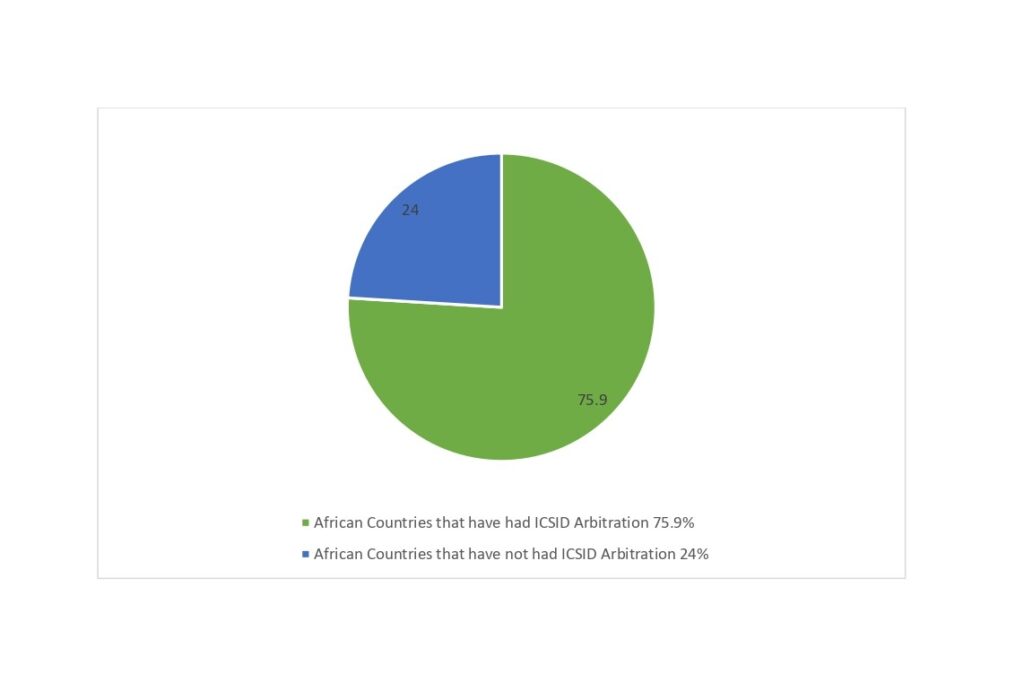
Ratio of African States that have had Arbitration at ICSID Arbitration
Figure 2: G.O. Sodipo & co. ICSID Africa Report
2.1 ICSID Arbitration cases against African State by Region of Africa
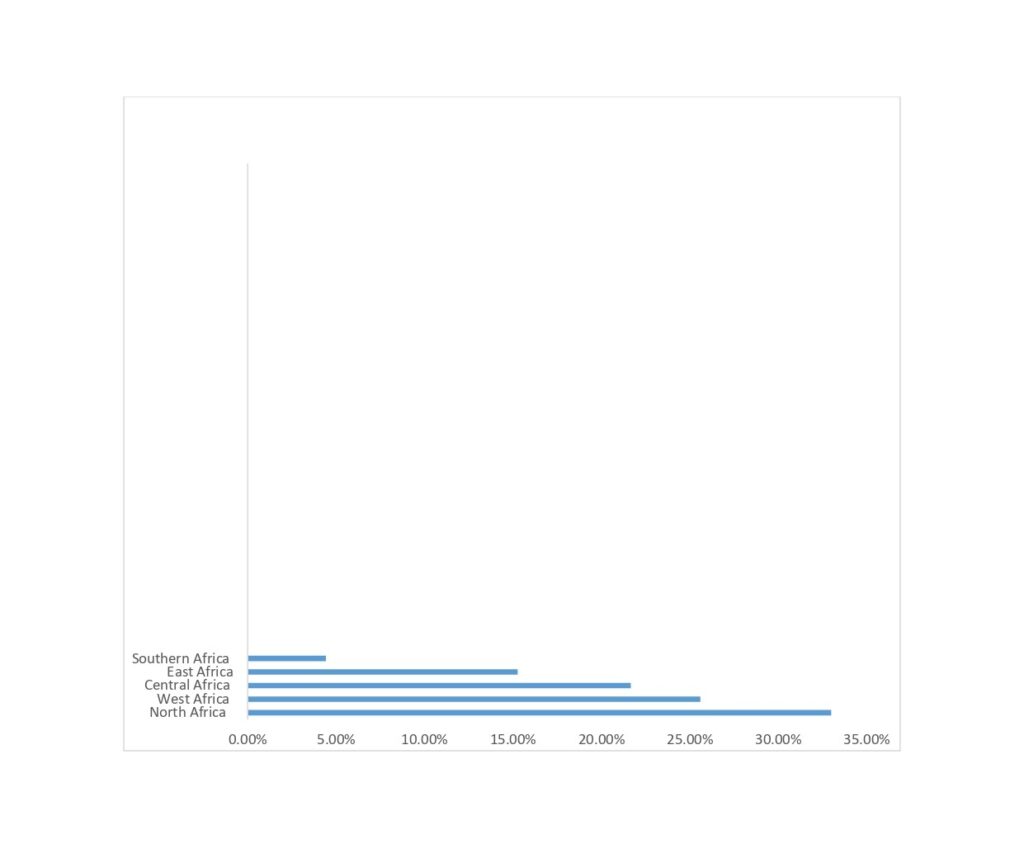
Number of ICSID Arbitration cases against African states per region
Figure 3: G.O. Sodipo & co. ICSID Africa Report
The above figure reflects the number of ICSID arbitrations that have been instituted against African states per region. The largest number of ICSID arbitrations per African region is Northern African nations with 33% of the ICSID arbitrations in Africa with Egypt having 41, Algeria with 10, Morocco with 10, Tunisia with 4, and Libya with 2. The next region of Africa with the most ICSID arbitrations is West Africa with 25.6% of African ICSID cases. This may be partly due to the number of countries in the region. West African nations have the following number of ICSID arbitrations: Benin Republic (1), Burkina Faso (2), Cote d’Ivoire (2), Gambia (8), Ghana (3), Republic of Guinea (7), Liberia (3), Mali (4), Mauritania (2), Niger (2), Nigeria (6), Senegal (7), Sierra Leone (1), Togo (3) and Cabo Verde (1).
The next region is Central Africa with 21.18% of the ICSID arbitrations in Africa with Cameroon 9, the Central African Republic 3, the Democratic Republic of Congo 12, Burundi (4), the Republic of Congo with 7 Equatorial-Guinea 3, and Gabon 5. East African nations have 15.27% of the ICSID African state arbitrations with Kenya (3), Tanzania (11), Uganda (3) Mauritius (1) Rwanda (2), South Sudan (3), Sudan (2), Madagascar (5), and Seychelles (1). The ratio of ICSID Southern African arbitrations is 4.43% with the following nations: Angola (1) Mozambique (3), South Africa (1), Zambia (1), and Zimbabwe (3). There is no record that any ICSID arbitration has been instituted against the following African nations: Botswana, Chad, Comoros, Djibouti, Eswatini, Ethiopia, Lesotho, Guinea – Bissau, Malawi, Namibia, Sao Tome and Principe, Eritrea, and Somalia.
2.2 ICSID Arbitration cases instituted by African companies against African States
Of the 203 cases instituted against African states analyzed, 66 were instituted by African companies against African states, a ratio of 32.5% of all cases filed against African states. This shows that a reasonable number of African entities have instituted ICSID arbitration against African states. This number is likely to increase in future as other African investors realize that this is a viable option especially in the light of intra Africa trading that may increase pursuant to AfCFTA.
2.3 Instruments Invoked by African Business Entities against African States at ICSID Arbitration
Parties who institute ICSID arbitration must indicate the instrument they wish to invoke to vest ICSID with jurisdiction. Typical ICSID cases may raise ICSID, BIT or local law of the African state concerned. Of the 203 cases considered, 57 cases involved African entities as claimants against African States. In 24 of the 57 (42.10%) ICSID cases involving African entities against African States, the claimant company(s) invoked the contract between the party and the African state. In 21 of the 57 (36.84%) cases, the claimant company(s) invoked BITS. In 8 of the 57 (14%) cases the claimant company(s) invoked local investment laws of the relevant African states. 4 of the 57 (7%) cases the claimants invoked multiple instruments. This shows a prevalence of the invocation of contracts between the parties over BITS.
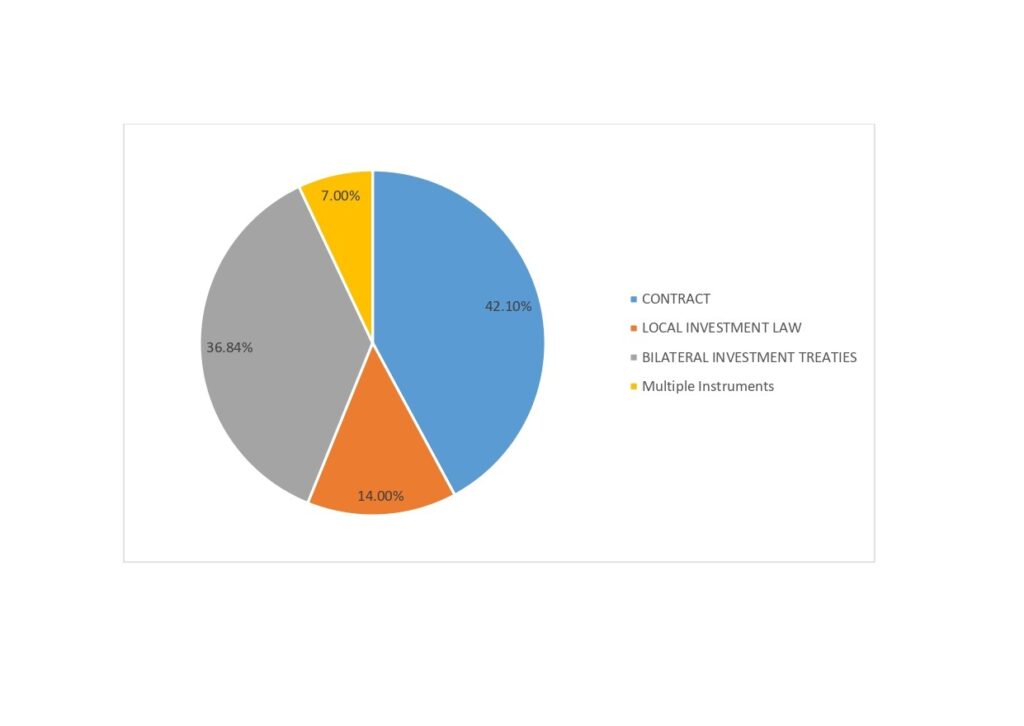
Instrument invoked by African Business entities as claimants or co-claimants against African states at ICSID Arbitration
Figure 4: G.O. Sodipo & co. ICSID Africa Report
2.3.1 Instruments Invoked by Non-African Business entities against African States at ICSID Arbitration
In a few cases, both African and non-African entities were investors claiming against the state.[10] For this study, the non-African business entities were counted individually and of the 203 cases considered, 150 cases were instituted by non-African entities as claimants or co-claimants, making three quarters of the total number of cases instituted during the period under study. In 45 of the 150 (30%) ICSID cases involving non-African entities against African states, the claimant company(s) invoked the contract between the party and the African state. In 86 of the 150 (57.33%) cases, the claimant company(s) invoked BITS. In 11 of the 150 (7.33%) cases the claimant company(s) invoked local investment laws of the relevant African states. In 7 of the 150 (4.66%) cases the claimants invoked multiple instruments. This shows a prevalence of the invocation of BITS by non-African entities against African states at ICSID.
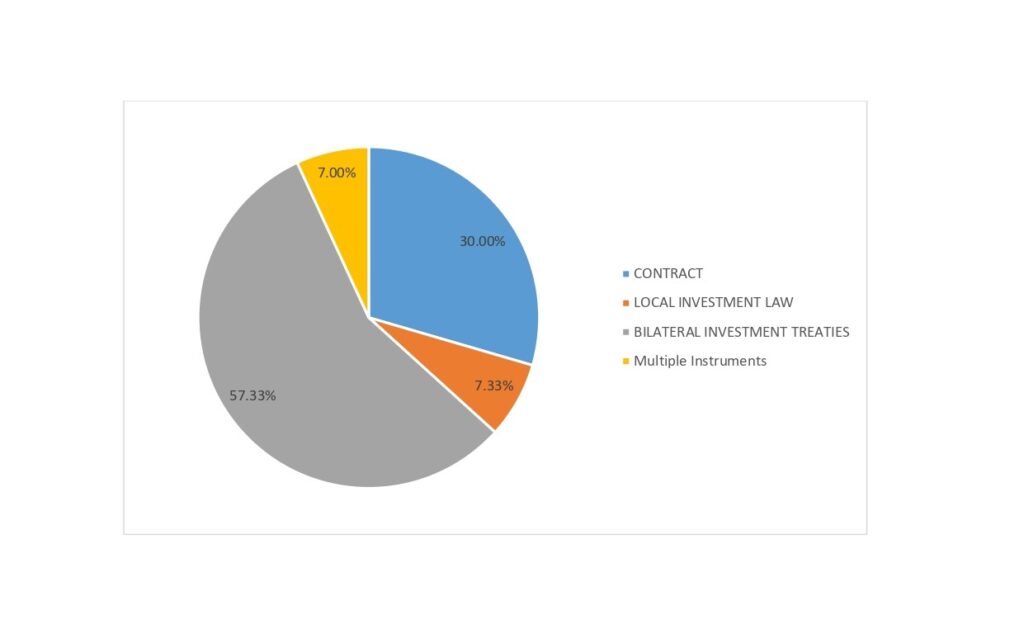
Instrument invoked by non-African entities as claimants against African states at ICSID Arbitration
Figure 5: G.O. Sodipo & co. ICSID Africa Report
2.3.2 Instruments Invoked by Claimants against African States at ICSID Arbitration[11]
In the last 50 years, 30.43% percent of parties who have instituted ICSID arbitrations against African states have relied on the contracts between them and the relevant states whilst 53.69% percent and 15.88% have relied on BITS and local investment statutes of the relevant African states respectively. The earliest BITS date from the 1970’s,[12] whilst some were only signed after 2010.[13] The investment statutes of African states relied upon by investors to institute ICSID arbitrations range from those in the sixties[14] to those after in the 2010.[15] These instruments were invoked largely by entities of non-African origin.
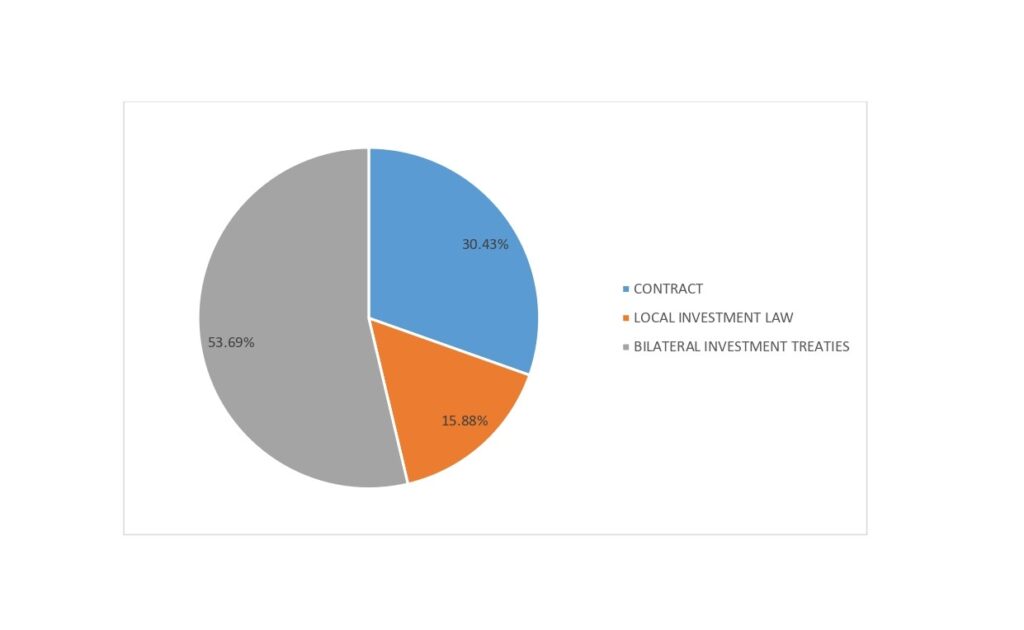
Instrument invoked by Claimants against African states at ICSID
Figure 6: G.O. Sodipo & co. ICSID Africa Report
2.4 Number of Discontinued Cases at ICSID Arbitration
80 of 203 (39.4%) of the cases analyzed, were discontinued. 55 of the 203 cases (27%) were discontinued due to parties’ settlement under Rule 43 (1) & (2) ICSID ArbitrationRules.16 of the 203 cases (7.88%) were discontinued at the request of a party under Rule 44 ICSID Arbitration Rules. 3 of the 203 cases (1.47%) were discontinued for failure of parties to act under Rule 45 ICSID Arbitration Rules, while 6 of the 203 cases (2.95%) were discontinued for lack of payment of required advances. The states whose arbitrations were discontinued for lack of payment of required advances are Tanzania, Senegal, Liberia, Gabon, Democratic Republic of Congo and Burkina Faso.
ICSID Arbitration Rules, ICSID Arbitration Rules, ICSID Arbitration Rules, ICSID Arbitration Rules, ICSID Arbitration Rules, ICSID Arbitration Rules, ICSID Arbitration Rules, ICSID Arbitration Rules, ICSID Arbitration Rules, ICSID Arbitration Rules, ICSID Arbitration Rules, ICSID Arbitration Rules
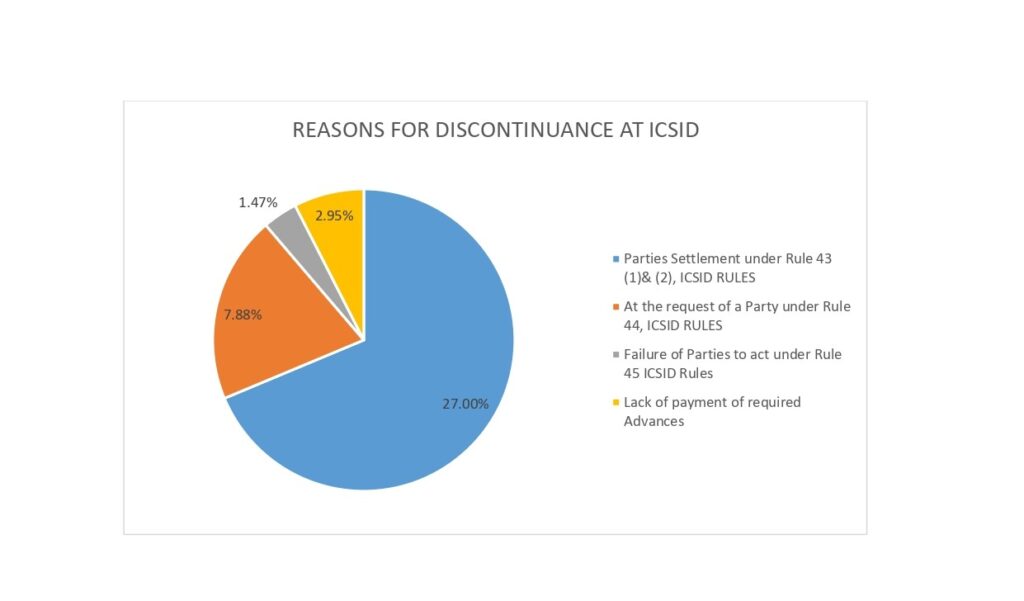
Reason for the Discontinuance of cases at ICSID
Figure 7: G.O. Sodipo & co. ICSID Africa Report
2.5 Subject Matter Nature of ICSID Arbitrations Against African States
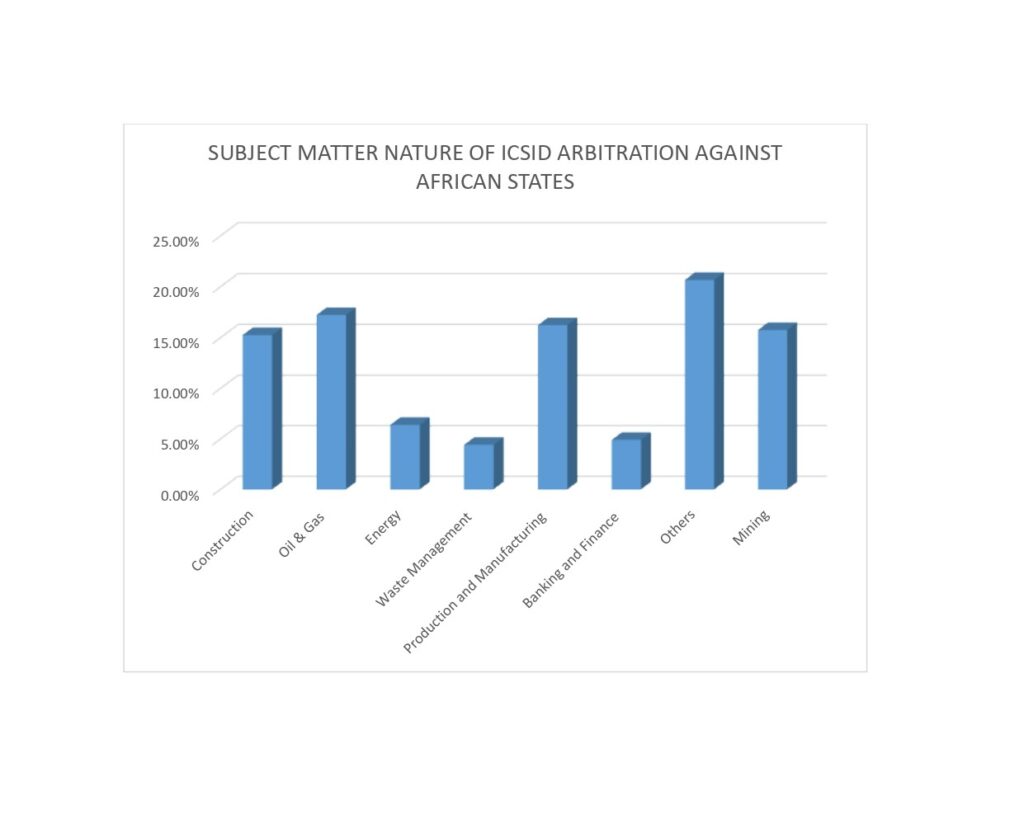
Subject Matter Nature of ICSID Arbitrations Against African States
Figure 8: G.O. Sodipo & co. ICSID Africa Report
Oil and Gas disputes account for 17.24% of the cases. Production and Manufacturing account for 16.25% of the disputes. These range from cement, to steel, textiles, beverage, pipes, agribusiness, to the processing of cotton. Mining disputes account for 15.76% of the cases. They include gold, diamond, cobalt and copper, salt, iron ore, mining concessions, phosphate and quarrying. Construction disputes account for 15.27% of the ICSID cases against African states. They include housing, public infrastructure, dams, fertilizer factory, gas pipelines construction and operation, airports, highways, hospitals maternity ward construction, sports facilities and port terminals. Energy accounts for 6.4% of the disputes such as coal, power purchase agreements, concessions, and the like. Banking and Finance account for 4.92% of the disputes and this includes services, operations and instruments, whilst waste management accounts for 4.43% of the disputes. The other sectors that are not easily classified which include hospitality, infrastructure, ownership of shares account for 20.68% of the disputes.[16]
2.6 Number of Awards for and Against African states at ICSID Arbitration
As at the time of going to the press, we could not access 23 of the 203 cases considered in the 1974-2024 period. These are cases with restricted access to the ICSID platforms, or details of the award are not in the public domain. 80 cases of the 203 cases were discontinued and 28 are currently pending. Of the 72 cases in which the award was accessible, 38 awards representing 53% were in favour of the state party and 34 awards representing 47% were in favour of the investor.
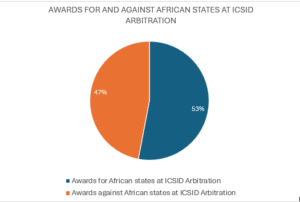
Awards for and against African states at ICSID Arbitration
Figure 9: G.O. Sodipo & co. ICSID Africa Report
2.7 Annulment Proceedings at ICSID
One of the features of ICSID is that it offers a kind of appeal process where parties can seek to annul the award through annulment proceedings. In the 50-year period under study, annulment proceedings were commenced in 33 of the 203 cases under review. Annulment proceedings were initiated and won by African State parties in 6% of the annulment cases. No Annulment Proceeding was initiated and “fully” won by investors at ICSID proceedings involving African state parties. Annulment proceedings were initiated by African state parties and lost in 27.2% of the cases. Annulment proceedings were initiated and lost by investors in 18.1% of the cases. ICSID appears slightly skewed against African states in annulment proceedings as most were in favour of investors even though state parties filed the annulment proceedings most of the time.
For general context, of the 33 cases in which annulment proceedings were commenced, over a quarter, or 30.3%, were discontinued, and partial annulment was awarded in two cases.[17] 12.1% of the Annulment awards were not found or had restricted access and 2 are currently pending. Of the 51.5% that were accessible, the State party’s request for annulment failed in 52.9% of the cases. The State party’s request for annulment succeeded only in 11.7% of the cases and the investor’s request for annulment was dismissed in 35.2% of the cases which accounts for all the cases investors filed for annulment.
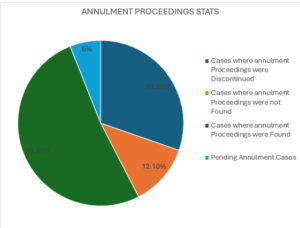
Annulment proceedings Between State Parties and Investors
Figure 10: G.O. Sodipo & co. ICSID Africa Report
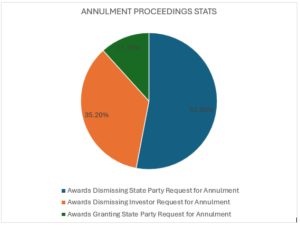
Annulment proceedings Between State Parties and Investors
Figure 11: G.O. Sodipo & co. ICSID Africa Report
2.8 Diversity of Arbitrators Appointed in ICSID Arbitrations against African States
This section discusses the extent to which the appointment of arbitrators shows diversity in the percentage of Africans appointed and the percentage of females. It dovetails into the last section that seeks to correlate the lackadaisical pattern among African nations in terms of maintaining a current list of Arbitrators from which parties may appoint for ICSID arbitration.
The total number of ICSID proceedings involving African state parties where a tribunal was constituted including annulment proceedings was 183 out of the 203 cases considered in the 50-year period from 1974 to 2024. In the period under review, an African sat at ICSID proceedings involving African state parties where a tribunal was constituted about 28.41% of the time. This means that the total instances where an African sat at an ICSID tribunal involving an African state party was 52. On the other hand, the number of times where a non-African sat at an ICSID tribunal involving an African state party was 183 times. There is no ICSID Arbitration where all the Arbitrators were Africans. What this means is that for all ICSID Arbitration against African states in the last 50 years, non-Africans have always been appointed as part of the panel. That is, a non-African sat at ICSID proceedings involving African state parties where a tribunal was constituted about 100% of the time.
Of the cases evaluated in which arbitrators had been appointed, including the annulment and resubmission proceedings a total of 271 Arbitrators were appointed in cases involving African state parties. Of the total number of arbitrators, only 40 representing 14.76% were Africans.
The number of female arbitrators appointed was low. Of the 271 total arbitrators appointed for the ICSID cases, only 31 representing 11.43% were females. Worse still, only 4 females were Africans, this represents 12.9% of the females that served as Arbitrators in ICSID Arbitrations against African states in 50 years. All hands must be on deck to change this.
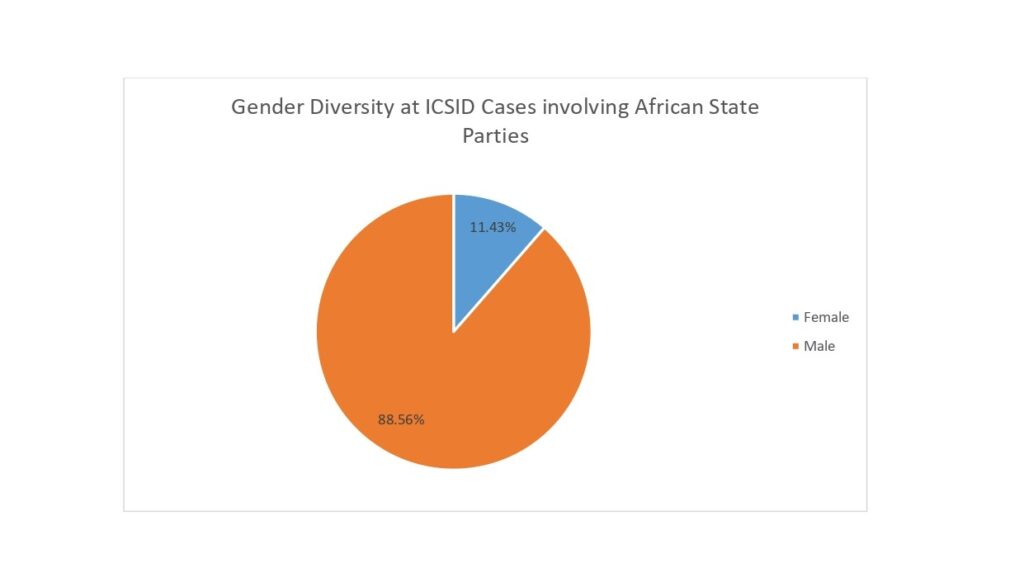
Gender Diversity at ICSID cases involving African State Parties
Figure 12: G.O. Sodipo & co. ICSID Africa Report
2.9 Current ICSID African State Arbitrators listing stat
Whilst complaints may be raised against the low patronage of African arbitrators in cases ICSID Arbitration against African states, the African states have a share of the blame Many African states have failed to maintain a current list of Arbitrators in the list of panel members that can be chosen for ICSID Arbitration. Some have not even ratified ICSID Convention. For instance, whilst South Africa, Libya, and Equatorial-Guinea are not signatories to the ICSID, they have bilateral investment treaties that have recourse to ICSID arbitration. Ethiopia, Guinea-Bissau, and Namibia are signatories to ICSID, but they are yet to ratify same. This may account for the absence of listed arbitrators, however, in line with Article 13 of the ICSID convention, ‘each contracting state may designate to each Panel four persons who may but need not be its nationals.’ Eritrea is also a non-party to the ICSID convention.
Of the 50 African states listed on the ICSID site, the Republic of Congo, Cote d’Ivoire, Djibouti, Eswatini, Ethiopia, Equatorial-Guinea, Guinea–Bissau, Libya, Namibia, Sao Tome and Principe, South Africa and South Sudan have no information on Arbitrator listing on the ICSID site.
The following 22 of 50 (44%) African counties listed Arbitrators all of whom have expired terms: Algeria, Benin Republic, Burkina Faso, Burundi, Central African Republic, Comoros, Congo Democratic Republic Of, Gabon, Ghana, Republic of Guinea, Lesotho, Liberia, Malawi, Mali, Mauritius, Morocco, Rwanda, Senegal, Seychelles, Tanzania, Togo, Tunisia, Zimbabwe. Only 56% of African counties listed Arbitrators who have active terms. Somalia Comoros and Egypt only have one active listed Arbitrator.
African states have appointed Africans of other nationalities as Arbitrators in ICSID proceedings. Some states even listed Africans of other nationalities in their panel.[18] Investors and African states often appoint African counsel as co-counsel although the number is still relatively low. In particular, the government in-house counsel is regularly appointed as co-counsel by African state parties. This is the way to go.
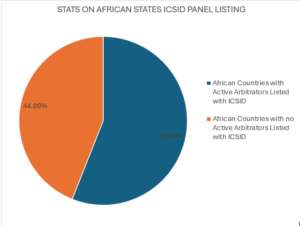
AFRICAN STATES ICSID ARBITRATOR LISTING STAT
Figure 13: G.O. Sodipo & co. ICSID Africa Report
3.0 Conclusion
The study is revealing. It shows the trends in ICSID Arbitration cases against African states. It shows that more awards have been given in favour of African states that awards that were issued against African states by ICSID. More annulment proceedings were concluded in favour of African states than investors. This study suggests that the seeming bias towards investors and against African states in ICSID Arbitration is unjustified. A number of the cases were discontinued by the parties once ICSID arbitration commenced, this may be regarded as a plus for the Investor-State Dispute Settlement system.
The study suggests that we can increase the number of African Arbitrators appointed to handle ICSID arbitrations if African states maintain current lists in the ICSID panel and if they then choose from the list of Africans. The study suggests that there must be diversity in the appointment of female Arbitrators to ICSID arbitration.
Appendix 1
Arbitrators appointed in ICSID cases against African States
Klaus SACHS (German), Stephen L. DRYMER (Canadian), Charles PONCET (Swiss), Jan PAULSSON (Bahraini, French, Swedish), Maxi SCHERER (German), Hamid G. GHARAVI (French, Iranian), Bernard HANOTIAU (Belgian), Paolo Michele PATOCCHI (Swiss), Ali BENCHENEB (Algerian, French), Loretta MALINTOPPI (Italian), Stanimir A. ALEXANDROV (Bulgarian), Karim HAFEZ (Egyptian), Laurent LÉVY (Brazilian, Swiss) L. Yves FORTIER (Canadian) Gabrielle KAUFMANN-KOHLER (Swiss) Brigitte STERN (French)) Albert Jan VAN DEN BERG (Dutch) Peter TOMKA (Slovak)Bertha COOPER-ROUSSEAU (Bahamian) Kamal HOSSAIN (Bangladeshi) David A.R. WILLIAMS (New Zealand) Pierre TERCIER (Swiss) Emmanuel GAILLARD (French) André J.E. FAURÈS (Belgian) Arghyrios A. FATOUROS (Greek) Séna AGBAYISSAH (Togolese) Aron BROCHES (Dutch) Anna JOUBIN-BRET (French) Gilbert GUILLAUME (French) Jean-Denis BREDIN (French) Ahmed Sadek EL-KOSHERI (Egyptian) Prosper WEIL (French) Yas BANIFATEMI (French, Iranian) Mohammed BEDJAOUI (Algerian) Juan FERNÁNDEZ-ARMESTO (Spanish) Fernando MANTILLA-SERRANO (Colombian) Benfeito Mosso RAMOS (Cabo Verdean) Constantine PARTASIDES (British, Cypriot) Andrea K. BJORKLUND (U.S.) Pierre BIENVENU (Canadian) Thomas CLAY (French) Téa-Corinne KINTA (Congolese, French) Nassib G. ZIADÉ (Chilean, Lebanese) Pierre MAYER (French) Barton LEGUM (U.S.)Azzedine KETTANI (Moroccan) Dany KHAYAT (French, Lebanese) Gaston KENFACK DOUAJNI (Cameroonian) Alexis MOURRE (French) Alain PELLET (French) Raed FATHALLAH (Canadian, French, Lebanese) Stephen JAGUSCH (New Zealand) Frédérique CHIFFLOT BOURGEOIS (French) Marino BALDI (Swiss) J. Caleb BOGGS III (U.S.) Jean-Pierre ANCEL (French) Eduardo JIMENEZ DE ARECHAGA (Uruguayan) William D. ROGERS (U.S.) Dominique SCHMIDT (French) François TKINT (Belgian) Marie-Madeleine MBORANTSUO (Gabonese) -F Philippe MERLE (French) Antoine GROTHE (Central African) Salim MOOLLAN (French, Mauritian) Mohamed SHELBAYA (Egyptian, French) Horacio A. GRIGERA NAÓN (Argentine) Otto L.O. DE WITT WIJNEN (Dutch) Dominique GRISAY (Belgian) Teresa GIOVANNINI (Swiss) Franklin BERMAN (British) Yawovi AGBOYIBO (Togolese) Alioune DIAGNE (Senegalese) Carveth Harcourt GEACH (South African) Henri C. ÁLVAREZ (Canadian) William W. PARK (Swiss, U.S.) Marie-Andrée NGWE (French) Marc LALONDE (Canadian) Catherine KESSEDJIAN (French) Raúl E. VINUESA (Argentine, Spanish) Andreas F. LOWENFELD (U.S.) Andreas BUCHER (Swiss) Willard Z. ESTEY (Canadian)Sompong SUCHARITKUL (Thai) Heribert GOLSONG (German) Kéba MBAYE (Senegalese) Eric SCHWARTZ (French, U.S.) Erica STEIN (Belgian, U.S.) John M. TOWNSEND (U.S.) Aimery DE SCHOUTHEETE (Belgian) Jørgen TROLLE (Danish) Rudolf BYSTRICKY (Czechoslovak) Edilbert RAZAFINDRALAMBO (Malagasy) René-Jean DUPUY (French) Fuad ROUHANI (Iranian) Zachary DOUGLAS (Australian) Kaj HOBÉR (Swedish) Daniel M. PRICE (U.S.) Toby LANDAU (British) V.V. VEEDER (British) Robert BRINER (Swiss) Laurent AYNÈS (French) Ignaz SEIDL-HOHENVELDERN (Austrian) Mohamed Yassin ABDEL A AL (Sudanese) Luca G. RADICATI DI BROZOLO (British, Italian) Gavan GRIFFITH (Australian) Elizabeth GLOSTER (British) Carole MALINVAUD (French) James SPIGELMAN (Australian) Bruno SIMMA (Austrian, German) Claus VON WOBESER (German, Mexican) Lawrence BOO (Singaporean) Ian BINNIE (Canadian) John Y. GOTANDA (U.S.) Nayla COMAIR-OBEID (French, Lebanese) Gordon SMITH (British, New Zealand) Bernardo M. CREMADES (Spanish) Joongi KIM (Korean) Michael C. PRYLES (Australian, Austrian) Laurence BOISSON DE CHAZOURNES (French, Swiss) Hans VAN HOUTTE (Belgian) Richard MCLAREN (Canadian) Makhdoom Ali KHAN (Pakistani) Andrés RIGO SUREDA (Spanish) J. William ROWLEY (British, Canadian) Mark A. CLODFELTER (U.S.) Arif Hyder ALI (Pakistani, U.S.) Christer SÖDERLUND (Swedish) Rodrigo OREAMUNO (Costa Rican) Cecil W.M. ABRAHAM (Malaysian) Stephen M. SCHWEBEL (U.S.) J. Christopher THOMAS (Canadian) Abdulqawi Ahmed YUSUF (Somali) Jonathan MANCE (British) Campbell Alan MC LACHLAN (New Zealand) Donald M. MCRAE (Canadian, New Zealand) Christoph H. SCHREUER (Austrian) Teresa CHENG (Chinese) Veijo HEISKANEN (Finnish) Luiz Olavo BAPTISTA (Brazilian) Pierre-Yves TSCHANZ (Irish, Swiss) Yves DERAINS (French) Michael J. A. LEE (British) Rudolf DOLZER (German) C.G. WEERAMANTRY (Sri Lankan) William Laurence CRAIG (U.S.) Ibrahim FADLALLAH (French, Lebanese) Alain VIANDIER (French) Karl-Heinz BÖCKSTIEGEL (German) Piero BERNARDINI (Italian) Don WALLACE JR. (U.S.) Monroe LEIGH (U.S.) Hamzeh HADDAD (Jordanian) Michael F. HOELLERING (U.S.)Mohamed Amin Elabassy EL MAHDI (Egyptian) – Robert F. PIETROWSKI, JR. (U.S.) Pascal HOLLANDER (Belgian) Stephan SCHILL (German) Ioannis VASSARDANIS (Greek) Mohamed ABDEL RAOUF (Egyptian) Hannah TÜMPEL (German) Charles JARROSSON (French) Michel GENTOT (French) Victor-Gaston MARTINY (Belgian) Hans SPITZNAGEL (Swiss) Claude REYMOND (Swiss) Henri CAILLAVET (French) Edgar FAURE (French) Céline LÉVESQUE (Canadian) Melanie VAN LEEUWEN (Dutch) Donald DONOVAN (U.S.) Jean Engelmayer KALICKI (U.S.) Doug JONES (Australian, Irish) Franco FERRARI (Italian) Charles N. BROWER (U.S.) Samuel K.B. ASANTE (Ghanaian) Kenneth S. ROKISON (British) Muna B. NDULO (Zambian) Robert Y. JENNINGS (British) Bernardo SEPÚLVEDA AMOR (Mexican) Jean-Michel JACQUET (French) Vera VAN HOUTTE (Belgian) Donald E. ZUBROD (U.S.) Jack BERG (U.S.) David K. SHARPE (U.S.) Pieter SANDERS (Dutch) Jean-François PRAT (French) Kanaga DHARMANANDA (Australian) Joe SMOUHA (British) Swithin J. MUNYANTWALI (British, Ugandan) Andrew ROGERS (Australian) James R. CRAWFORD Ian FORRESTER (British) Maureen PONSONBY (British) Jorge GONCALVES PEREIRA (Portuguese) D.A. REDFERN (British) Frank CHURCH (U.S.) John R. CROOK (U.S.) Antonio CRIVELLARO (Italian) John BEECHEY (British) David A.O. EDWARD (British) Dominique CARREAU (French) Raymond RANJEVA (Malagasy) Eric TEYNIER (French) François SUREAU (French) Robert S.M. DOSSOU (Beninese) Mélanie RIOFRIO PICHÉ (Canadian, Ecuadorian) N. Fernando PIÉROLA CASTRO (Peruvian, Swiss) Attila Massimiliano TANZI (Italian) José ROSELL (French) Samuel WORDSWORTH (British) Robert H. SMIT (U.S.) Gunnar LAGERGREN (Swedish) J.C. SCHULTSZ (Dutch) Paul REUTER (French) Sture PETRÉN (Swedish) John FOSTER (British) Peter REES (British) J. Brian CASEY (Canadian) Patrick HUBERT (French) Mohamed S. ABDEL WAHAB (Egyptian) Neil KAPLAN (British) Nabil ELARABY (Egyptian) Julian D.M. LEW (British) Edward TORGBOR (British, Ghanaian) Ivan WALLENBERG (Swedish) Elihu LAUTERPACHT (British) Nicholas PHILLIPS (British) J. Truman BIDWELL JR. (U.S.) Barbara DOHMANN (British, German) Pierre LALIVE (Swiss) Ronny ABRAHAM (French) Rudolf BINDSCHEDLER (Swiss) Jean VAN HOUTTE (Belgian) Peter POLAK (Austrian) Anthony MASON (Australian) August REINISCH (Austrian) Guido Santiago TAWIL (Argentine, Portuguese) Olufunke ADEKOYA (British, Nigerian) F Vaughan LOWE (British) Joseph M. MATTHEWS (U.S.) Baiju S. VASANI (British, U.S.) Dorothy Udeme UFOT (Nigerian) F Ucheora ONWUAMAEGBU (British, Nigerian) Hélène RUIZ FABRI (French) Cavinder BULL (Singaporean) Doak BISHOP (U.S.) Sanji Mmasenono MONAGENG (Botswana) F Christopher Adebayo OJO (Nigerian) Gérard NIYUNGEKO (Burundi) Christopher GREENWOOD (British) Achille NGWANZA (Cameroonian) O. Thomas JOHNSON (U.S.) Edward William Fashole LUKE II (Botswana) Nicolas ANGELET (Belgian) Arnaud DE NANTEUIL (French) David UNTERHALTER (Maltese, South African) Stanley BURNTON (British) Gary B. BORN (U.S.) Hervé ASCENSIO (French) Xavier BOUCOBZA (French) Yves DAUDET (French) Marc GRÜNINGER (Swiss) António M. R. SAMPAIO CARAMELO (Portuguese) Pierre B. MEUNIER (Canadian) Giorgio BERNINI (Italian) Wendy J. MILES (New Zealand) Michael HWANG (Singaporean) A. Peter MUTHARIKA (Malawian) An CHEN (Chinese) Ronald A. CASS (U.S.) Mohammad WASI ZAFAR (Pakistani)
ICSID Arbitration Rules, ICSID Arbitration Rules, ICSID Arbitration Rules, ICSID Arbitration Rules, ICSID Arbitration Rules, ICSID Arbitration Rules, ICSID Arbitration Rules, ICSID Arbitration Rules, ICSID Arbitration Rules, ICSID Arbitration Rules, ICSID Arbitration Rules, ICSID Arbitration Rules,
Appendix 2
List by African States of Africans on the ICSID Panel
ALGERIA
NAME END OF TERM
| Maître Farid BEN BELKACEM | Jan 18, 2023 |
| Mohamed CHEMLOUL | Jan 18, 2023 |
| Maître Ali HAROUN | Jan 18, 2023 |
| Prof. El Oualid LAGGOUNE | Jan 18, 2023 |
| Prof. Hocine BENISSAD | Jan 18, 2023 |
| Prof. Belgacem BOUDRA | Jan 18, 2023 |
| Maître Ahcѐne BOUOUDEN | Jan 18, 2023 |
ANGOLA
| Dr. Carlos Maria DA SILVA FEIJÓ | Jan 27, 2029 |
| Prof. Dr. Lino DIAMVUTU | Jan 27, 2029 |
| Prof. Sofia MAIA DO VALE (i) | Jan 27, 2029 |
| Ms. Itweva NOGUEIRA (i) | Jan 27, 2029 |
BENIN REPUBLIC
| Maître Désiré AÏHOU | Apr 11, 2024 |
| Maître Raymond DOSSA | Apr 11, 2024 |
| Maître Rufino D’ALMEIDA | Apr 11, 2024 |
| Maître Luciano HOUNKPONOU | Apr 11, 2024 |
| M. Flavien BACHABI | Apr 11, 2024 |
| Maître Arthur BALLÉ | Apr 11, 2024 |
BOTSWANA
| Mr. Edward William Fashole Luke | Sep 23, 2025 |
| Dr. Athaliah Lesiba Molokomme | Sep 23, 2025 |
| Judge Sanji Mmasenono Monageng | Sep 23, 2025 |
BURKINA FASO
| Mr. Sibili Franck COMPAORE | Sep 07, 2010 |
| Mr. Victor KAFANDO | Sep 07, 2010 |
| Mr. Ignace YERBANGA | Sep 07, 2010 |
| Mr. Dobo Martin ZONOU | Sep 07, 2010 |
| Mr. Ambroise Marie BALIMA | Sep 07, 2010 |
| Mr. Mamadou GUIRA | Sep 07, 2010 |
| Mrs. Gertrude M. OUEDRAOGO | Sep 07, 2010 |
| Mr. Adama TRAORE | Sep 07, 2010 |
BURUNDI
| Prof. Nicolas ANGELET (i) | Sep 17, 2016 |
| Mr. Sixte Sizimwe KAZIRUKANYO | Sep 17, 2016 |
| Prof. Gérard NIYUNGEKO | Sep 17, 2016 |
| Mr. Fabien SEGATWA | Sep 17, 2016 |
CABO VERDE
| Mr. Hélio SANCHES | May 17, 2028 |
CAMEROON
| Roger Synphorien BAFAKAN BEHALAL | May 16, 2028 |
| Sylvie Ivonne BEBOHI EBONGO | May 16, 2028 |
| Gaston Kenfack Douajni | May 16, 2028 |
| Mougnal SIDI | May 16, 2028 |
| Brigitte ADA NNENGUE LEBRETON | May 16, 2028 |
| Jean Bosco ESSOH | May 16, 2028 |
| Mme Fadimatou HAYATOU | Oct 06, 2021 |
| Benoit Placide MEVOUA | May 16, 2028 |
CENTRAL AFRICAN REPUBLIC
| Mr. Célestin GAOMBALE | Oct 27, 1986 |
| Mr. Léopold SAMBA | Oct 27, 1986 |
| Mr. Antoine GROTHE | Oct 27, 1986 |
| Mr. Albert KOUDA | Oct 27, 1986 |
| Mr. Joseph MANDE-DJAPOU | Oct 27, 1986 |
| Mr. Levy SOBANGUE | Oct 27, 1986 |
CHAD
| Mbaigangnon ATHANASE | Apr 22, 2026 |
| Stephane BROQUET | Apr 22, 2026 |
| Victoire KOLINGAR-LHERMENIER | Apr 22, 2026 |
| Yenan TIMOTHÉE | Apr 22, 2026 |
COMOROS
| Hounaïdat ALI (i) |
Apr 22, 2030 | |
| Mr. Nidhoim ATTOUMANE |
Sep 01, 1987 | |
| Mrs. Kassimou HARIMIA |
Sep 01, 1987 | |
| Mr. Ali SALIM |
Sep 01, 1987 |
CONGO, DEMOCRATIC REPUBLIC OF
| Adèle KALAMBAY NDAYA MOLEKA | Mar 26, 2018 |
| Mr. Néhémie MWILANYA WILONDJA | Sep 25, 2019 |
| Prof. Kolongele EBERANDE | Sep 25, 2019 |
| Prof. Dieudonné LUABA NKUNA | Sep 25, 2019 |
| Mr. Tshibangu KALALA | Oct 24, 2018 |
| Mr. Célestin TUNDA YA KASENDE | Oct 24, 2018 |
CONGO, REPUBLIC OF -NOT STATED
COTE D’IVOIRE- NOT STATED
DJIBOUTI- NOT STATED
EGYPT
| Karim HAFEZ (i) | May 03, 2023 |
| Judge Moustafa ELBAHABETY | Oct 15, 2024 |
| Mohamed Sameh AMR | Jul 11, 2029 |
| Mahmoud FAWZY ADL-BARY ASAR | May 03, 2024 |
| Prof. Tarek RIAD (i) | May 03, 2023 |
ETHIOPIA -NOT STATED
ERITREA -NOT STATED
GABON
| Dr. Jean Paul ANGOENNAH ESSYNGONE | Sep 04, 2020 |
| Dr. Marie-Madeleine MBORANTSUO | Sep 04, 2020 |
| Prof. Etienne NSIE | Sep 04, 2020 |
| Prof. Guy ROSSATANGA-RIGNAULT | Sep 04, 2020 |
| Maître Norbert ISSIALH | Sep 04, 2020 |
| M. Honoré MOUNDOUNGA | Sep 04, 2020 |
| M. Modeste OBIANG NDONG | Sep 04, 2020 |
| Prof. Guillaume PAMBOU TCHIVOUNDA | Sep 04, 2020 |
GAMBIA
| Ida-Denise DRAMEH (i) | Aug 25, 2027 |
| Edi M. O. FAAL (i) | Aug 25, 2027 |
| Hassan B JALLOW | Aug 25, 2027 |
| Aminatta L.R. N’GUM (i) | Aug 25, 2027 |
| The Hon. Amina Saho CEESAY | Aug 25, 2027 |
| Alieu Badara DEMBA | Aug 25, 2027 |
| The Hon. Basiru Vassili POTIER MAHONEY (i) | Aug 25, 2027 |
| The Hon. Raymond Claudius SOCK (i) | Aug 25, 2027 |
GHANA
| Emmanuel AMOFA | Jul 28, 2023 |
| Ace Anan ANKOMAH | Jul 28, 2023 |
| Francis BOTCHWAY | Jul 28, 2023 |
| Dr. Emmanuel OPOKU AWUKU | Sep 02, 2020 |
| Vincent Kizito BEYUO | Jul 28, 2023 |
| Kow ESSUMAN | Jul 28, 2023 |
| Mangowa A. GHANNEY | Jul 28, 2023 |
| Mercy Louise OHENE | Jul 28, 2023 |
EQUATORIAL-GUINEA-NOT STATED
REPUBLIC OF GUINEA
| Mr. Damou SAKO | Jan 15, 1987 |
| Mr. Mamba SANO | Jan 15, 1987 |
GUINEA – BISSAU- NOT STATED
KENYA
| Arthur Konye IGERIA | Sep 19, 2028 |
| Kamau KARORI | Sep 19, 2028 |
| Githu MUIGAI | Sep 19, 2028 |
| John OHAGA | Sep 19, 2028 |
| Wanjiru KARANJA | Sep 19, 2028 |
| Eunice LUMALLAS | Sep 19, 2028 |
| Calvin M. NYACHOTI | Sep 19, 2028 |
| Grace NZIOKA | Sep 19, 2028 |
LESOTHO
| Mr. P.T. MAFIKE | Oct 03, 1989 |
| Mr. S. MONTS’I | Oct 03, 1989 |
| Mr. T. MAKEKA | Oct 03, 1989 |
| The Hon. Justice B.K. MOLAI | Oct 03, 1989 |
LIBERIA
| Mr. Philip A.Z BANKS III | Jul 01, 1991 |
| Mr. James S. GUSEH | Jul 01, 1991 |
| Mr. Samuel MCINTOSH | Jul 01, 1991 |
| Mr. Momolue B. TAMBA | Jul 01, 1991 |
| Mr. E. Winfred SMALLWOOD | Jul 01, 1991 |
| Mr. Frank W. SMITH | Jul 01, 1991 |
LIBYA
MADAGASCAR
| Lalaoniaina Odile ANDRIANARISOA | Jun 02, 2026 |
| Raphael JAKOBA | Jun 02, 2026 |
| Josiane Marie Chantal RAZAFINARIVO | Jun 02, 2026 |
| Rivoniaina RAZAFINDRAKOTO | Jun 02, 2026 |
MALAWI
| Prof. A. Peter MUTHARIKA | Apr 23, 2012 |
MALI
| M. Samba AMINETA SARR | Jul 13, 2021 |
| M. Boubacar Sidiki DIARRAH | Jul 13, 2021 |
| Me Boubacar SOW | Jul 13, 2021 |
| M. Sékou TRAORE | Jul 13, 2021 |
MAURITANIA
| Jemal OULD AGATT | Nov 29, 2029 |
MAURITIUS
| Mr. Désiré BASSET | Jan 14, 2022 |
| Mr. Ravindra CHETTY | Jan 14, 2022 |
| Mr. Raouf GULBUL | Jan 14, 2022 |
| Salim Moollan (i) | Jan 14, 2022 |
MOROCCO
| M. Idriss BOUZIANE | May 28, 2022 |
| M. El Hassan EL GUASSIM | May 28, 2022 |
| M. El Houcine KHALIFA | May 28, 2022 |
| Dr. Abdelkader LAHLOU | May 28, 2022 |
MOZAMBIQUE
| Angelo MATUSSE | Jan 24, 2026 |
NAMIBIA – NOT STATED
NIGER
| Abdoulaye HAMMA | Dec 15, 2027 |
| Boukar MAMAN MAMOUDOU KOLO | Dec 15, 2027 |
NIGERIA
| Olufunke ADEKOYA (i) | Feb 23, 2030 |
| Babatunde AJIBADE | Mar 26, 2030 |
| Yakubu Chonoko MAIKYAU | Mar 30, 2030 |
| Adedoyin O. RHODES-VIVOUR | Jan 27, 2029 |
| Taiwo Akinola ABIDOGUN | Mar 30, 2029 |
| Mr. Augustine O. ALEGEH | Jul 04, 2022 |
| Mrs. Stella ANUKAM, FCIArb, FCIS | Jul 04, 2022 |
| Mr. Chukwuma Uchenna EKOMARU, SAN, FCIArb | Jul 04, 2022 |
RWANDA
| Mr. Robert BAFAKULERA | Oct 22, 2021 |
| Ms. Anita MUGENI | Oct 22, 2021 |
| Mr. Richard MUGISHA | Oct 22, 2021 |
| Ms. Bernadette UWICYEZA | Oct 22, 2021 |
| Ms. Clare AKAMANZI | Oct 22, 2021 |
| Ms. Isabelle KALIHANGABO | Oct 22, 2021 |
| M. Emmanuel KAMERE | Oct 22, 2021 |
| Dr. Faustin NTEZILYAYO | Oct 22, 2021 |
SAO TOME AND PRINCIPE – NOT STATED
SENEGAL
| Mr. Ousmane CAMARA | Jun 07, 2004 |
| Mr. Alioune DIAGNE | Jun 07, 2004 |
| Mr. Galaye SECK | Jun 07, 2004 |
SEYCHELLES
| Ms. Mahnaz MALIK (i) | May 14, 2018 |
| Prof. Giorgio SACERDOTI (i) | Jun 20, 2022 |
SIERRA LEONE
| Musa MEWA | Oct 12, 2027 |
| Patrick W. PEARSALL (i) | Jan 20, 2026 |
| Samuel U.B. SAFFA | Oct 12, 2027 |
| Christian VIDAL-LEÓN (i) | Oct 12, 2027 |
SOMALIA
| Judge Abdulqawi Ahmed YUSUF | Oct 28, 2022 |
| Guled YUSUF | May 05, 2026 |
| Maryan HASSAN | Jun 23, 2022 |
| Mr. Baiju S. VASANI (i) | Jun 20, 2022 |
SOUTH AFRICA NOT STATED
SOUTH SUDAN- NOT STATED
SUDAN
| Awn Shawkat Al-Khasawneh (i) | Apr 04, 2025 |
TANZANIA
| Mr. Elisifa KINASHA | Aug 26, 2005 |
| Mr. M.J.A. LUKWARO | Aug 26, 2005 |
| Ms. Verdiana Nkwabi MACHA | Aug 26, 2005 |
| Mr. K.M.I.M. MSITA | Aug 26, 2005 |
TOGO
| Dorothy Udeme UFOT (i) | Feb 01, 2023 |
| Séna AGBAYISSAH | May 08, 2023 |
| Hounaké KOSSIVI | May 08, 2023 |
| Tchitchao TCHALIM | May 08, 2023 |
TUNISIA
| Me. Ghazi GHERAIRI | Jan 02, 2021 |
| Me. Donia HEDDA ELLOUZE | Jan 02, 2021 |
| Me. Mohamed Fadhel MAHFOUDH | Jan 02, 2021 |
| Prof. Taoufik OUANES (i) | Jan 02, 2021 |
| Me. Abdessatar BEN MOUSSA | Jan 02, 2021 |
| Prof. Sami BOSTANJI | Jan 02, 2021 |
| Prof. Ferhat HORCHANI | Jan 02, 2021 |
| Prof. Mohamed SAYARI | Jan 02, 2021 |
UGANDA
| Geoffrey KIRYABWIRE | Feb 05, 2027 |
| Peters K. MUSOKE | Feb 05, 2027 |
| Chrispas NYOMBI | Mar 01, 2029 |
| Robina Kisubi SHONUBI | Feb 05, 2027 |
| Joseph ENYIMU | Feb 05, 2027 |
| Rose Lillian LUBWAMA | Feb 05, 2027 |
ZAMBIA
| James BANDA | May 28, 2030 |
| Nkusuwila NACHALWE-MBAO | May 28, 2030 |
| Kondwa Emily SAKALA-CHIBIYA | May 28, 2030 |
| Geoffrey W. SIMUKOKO | May 28, 2030 |
ZIMBABWE
| Mr. S.J. CHIHAMBAKWE | Oct 28, 2019 |
| Ms. Mercy Sibongile GWAUNZA | Oct 28, 2019 |
| Mrs. V. MUDIMU | Oct 28, 2019 |
| Mr. Lewis URIRI | Oct 28, 2019 |
| Mr. Tinoziva BERE | Oct 28, 2019 |
| Ms. P. DUBE | Oct 28, 2019 |
| Mr. C. DUBE | Oct 28, 2019 |
| Mrs. Melina MATSHIYA | Oct 28, 2019 |
List of all the Cases Considered
- Utsch M.O.V.E.R.S. International GmbH, Erich Utsch Aktiengesellschaft, and Helmut Jungbluth v. Arab Republic of Egypt (ICSID Case No. ARB/13/37)
- Olyana Holdings LLC v. Republic of Rwanda (ICSID Case No. ARB/10/10)
- Ossama Al Sharif v. Arab Republic of Egypt (ICSID Case No. ARB/13/5)
- Oded Besserglik v. Republic of Mozambique (ICSID Case No. ARB(AF)/14/2)
- Wena Hotels Limited v. Arab Republic of Egypt (ICSID Case No. ARB/98/4)
- AGEM Ltd v. Republic of Mali (ICSID Case No. ARB/21/62)
- Petronor E&P Gambia Limited and APCL Gambia B.V. v. Republic of The Gambia (ICSID Case No. ARB/17/38)
- HeidelbergCement AG and others v. Arab Republic of Egypt (ICSID Case No. ARB/21/50)
- African Petroleum Gambia Limited (Block A4) v. Republic of The Gambia (ICSID Case No. ARB/14/7)
- The Carlyle Group L.P. and others v. Kingdom of Morocco (ICSID Case No. ARB/18/29)
- AGIP S.p.A. v. People’s Republic of the Congo (ICSID Case No. ARB/77/1)
- KGL International for Ports, Warehousing, and Transport K.S.C.C. v. Arab Republic of Egypt (ICSID Case No. ARB/21/21)
- Salini Costruttori S.p.A. and Italstrade S.p.A. v. Kingdom of Morocco (ICSID Case No. ARB/00/4)
- AngloGold Ashanti (Ghana) Limited v. Republic of Ghana (ICSID Case No. ARB/16/15)
- Lundin Tunisia B.V. v. Republic of Tunisia (ICSID Case No. ARB/13/15)
- AVZ International Pty Ltd., Dathcom Mining SA and Green Lithium Holdings Pte Ltd. v. Democratic Republic of the Congo (ICSID Case No. ARB/23/20)
- Border Timbers Limited, Timber Products International (Private) Limited, and Hangani Development Co. (Private) Limited v. Republic of Zimbabwe (ICSID Case No. ARB/10/25)
- BSG Resources (Guinea) Limited and BSG Resources (Guinea) SÀRL v. Republic of Guinea (ICSID Case No. ARB/15/46)
- Congo Mining Ltd SARLU and Midus Holdings Limited v. Republic of Congo (ICSID Case No. ARB/21/58)
- Finetis SARL and Finetis Maroc SA v. Kingdom of Morocco (ICSID Case No. ARB/21/44)
- Hussain Sajwani, Damac Park Avenue for Real Estate Development S.A.E., and Damac Gamsha Bay for Development S.A.E. v. Arab Republic of Egypt (ICSID Case No. ARB/11/16)
- Korea National Oil Corporation, KNOC Nigerian West Oil Company Limited, and KNOC Nigerian East Oil Company Limited v. Federal Republic of Nigeria (ICSID Case No. ARB/23/19)
- Menankoto SARL v. Republic of Mali (ICSID Case No. ARB/21/38)
- Millicom International Operations B.V. and Sentel GSM S.A. v. Republic of Senegal (ICSID Case No. ARB/08/20)
- PETRONAS International Corporation Ltd and Azhan Bin Ali v. Republic of the Sudan (ICSID Case No. ARB/21/47)
- Société d’Energie et d’Eau du Gabon and Veolia Africa v. Gabonese Republic and Société de Patrimoine du service public de l’eau potable, de l’énergie électrique et de l’assainissement (ICSID Case No. ARB/18/36)
- Sudapet Company Limited v. Republic of South Sudan (ICSID Case No. ARB/12/26)
- Tariq Bashir and SA Interpétrol Burundi v. Republic of Burundi (ICSID Case No. ARB/14/31)
- Togo Terminal v. Republic of Togo (ICSID Case No. ARB/18/16)
- Total E&P Uganda BV v. Republic of Uganda (ICSID Case No. ARB/15/11)
- West African Aquaculture Ltd, Kurt Lennart Hansson and Martje Bolt Hansson v. Republic of The Gambia (ICSID Case No. ARB/18/10)
- Wise Solutions CDI, SA v. Republic of Côte d’Ivoire (ICSID Case No. ARB/17/48)
- Nachingwea U.K. Limited (UK), Ntaka Nickel Holdings Limited (UK) and Nachingwea Nickel Limited (Tanzania) v. United Republic of Tanzania (ICSID Case No. ARB/20/38)
- Meerapfel Söhne AG v. Central African Republic (ICSID Case No. ARB/07/10)
- AECI Mauritius Ltd v. Burkina Faso (ICSID Case No. ARB/21/18)
- Bay View Group LLC and The Spalena Company LLC v. Republic of Rwanda (ICSID Case No. ARB/18/21)
- CDC Group plc v. Republic of Seychelles (ICSID Case No. ARB/02/14)
- CMC Muratori Cementisti CMC Di Ravenna SOC. Coop., CMC MuratoriCementisti CMC Di Ravenna SOC. Coop. A.R.L. Maputo Branch and CMC Africa Austral, LDA v. Republic of Mozambique (ICSID Case No. ARB/17/23)
- Courts (Indian Ocean) Limited and Courts Madagascar S.A.R.L. v. Republic of Madagascar (ICSID Case No. ARB/13/34)
- Gruppo Officine Piccini S.p.A. v. Republic of Cameroon (ICSID Case No. ARB/23/21)
- Libyan Investment Authority v. Kingdom of Belgium (ICSID Case No. ARB(AF)/23/3)
- Société des Parcs d’Alger and Emirates International Investment Company LLC v. People’s Democratic Republic of Algeria (ICSID Case No. ARB/18/11)
- AHS Niger and Menzies Middle East and Africa S.A. v. Republic of Niger (ICSID Case No. ARB/11/11)
- Cortec Mining Kenya Limited, Cortec (Pty) Limited and Stirling Capital Limited v. Republic of Kenya (ICSID Case No. ARB/15/29)
- Gerald International Limited v. Republic of Sierra Leone (ICSID Case No. ARB/19/31)
- International Trust Company of Liberia v. Republic of Liberia (ICSID Case No. ARB/98/3)
- Kansanshi Mining Plc v. Republic of Zambia (ICSID Case No. ARB/20/17)
- Mauritanian Copper Mines S.A. v. Islamic Republic of Mauritania (ICSID Case No. ARB/21/9)
- Piero Foresti, Laura de Carli and others v. Republic of South Africa (ICSID Case No. ARB(AF)/07/1)
- Republic of Equatorial Guinea v. CMS Energy Corporation and others (ICSID Case No. CONC(AF)/12/2)
- Holiday Inns S.A. and others v. Morocco (ICSID Case No. ARB/72/1)
- Standard Chartered Bank v. United Republic of Tanzania (ICSID Case No. ARB/10/12)
- Consortium Groupement L.E.S.I. – DIPENTA v. People’s Democratic Republic of Algeria (ICSID Case No. ARB/03/8)
- Ridgepointe Overseas Developments, Ltd. v. Democratic Republic of the Congo and Générale des Carrières et des Mines (ICSID Case No. ARB/00/8)
- Petroceltic Holdings Limited and Petroceltic Resources Limited v. Arab Republic of Egypt (ICSID Case No. ARB/19/7)
- Biwater Gauff (Tanzania) Limited v. United Republic of Tanzania (ICSID Case No. ARB/05/22)
- Patrick Mitchell v. Democratic Republic of the Congo (ICSID Case No. ARB/99/7)
- International Holding Project Group and others v. Arab Republic of Egypt (ICSID Case No. ARB/18/31)
- American Manufacturing & Trading, Inc. v. Democratic Republic of the Congo (ICSID Case No. ARB/93/1)
- Tantalum International Ltd. and Emerge Gaming Ltd. v. Arab Republic of Egypt (ICSID Case No. ARB/18/22)
- Future Pipe International B.V. v. Arab Republic of Egypt (ICSID Case No. ARB/17/31)
- LP Egypt Holdings I, LLC, Fund III Egypt, LLC and OMLP Egypt Holdings I, LLC v. Arab Republic of Egypt (ICSID Case No. ARB/16/37)
- Champion Holding Company and others v. Arab Republic of Egypt (ICSID Case No. ARB/16/2)
- Al Jazeera Media Network v. Arab Republic of Egypt (ICSID Case No. ARB/16/1)
- ArcelorMittal S.A. v. Arab Republic of Egypt (ICSID Case No. ARB/15/47)
- Unión Fenosa Gas, S.A. v. Arab Republic of Egypt (ICSID Case No. ARB/14/4)
- Lundin Tunisia B. V. v. Republic of Tunisia (ICSID Case No. ARB/12/30)
- Bernhard von Pezold and others v. Republic of Zimbabwe (ICSID Case No. ARB/10/15)
- BSG Resources Limited (in administration), BSG Resources (Guinea) Limited and BSG Resources (Guinea) SÀRL v. Republic of Guinea (ICSID Case No. ARB/14/22)
- Carnegie Minerals (Gambia) Limited v. Republic of The Gambia (ICSID Case No. ARB/09/19)
- Elsewedy Electric for Transmission and Distribution of Energy S.A.E. v. Republic of South Sudan (ICSID Case No. ARB/23/44)
- Groupe Pizzorno Environnement v. Kingdom of Morocco (ICSID Case No. ARB/23/34)
- Grupo Francisco Hernando Contreras v. Republic of Equatorial Guinea (ICSID Case No. ARB(AF)/12/2)
- International Quantum Resources Limited, Frontier SPRL and Compagnie Minière de Sakania SPRL v. Democratic Republic of the Congo (ICSID Case No. ARB/10/21)
- Liberian Eastern Timber Corporation v. Republic of Liberia (ICSID Case No. ARB/83/2)
- LTME Mauritius Limited and Madamobil Holdings Mauritius Limited v. Republic of Madagascar (ICSID Case No. ARB/17/28)
- Michael Dagher v. Republic of the Sudan (ICSID Case No. ARB/14/2)
- Pathfinder Minerals PLC and IM Minerals Limited v. Republic of Mozambique (ICSID Case No. ARB/24/4)
- Richard N. Westbury, Paul D. Hinks and Symbion Power Tanzania Limited v. United Republic of Tanzania (ICSID Case No. ARB/19/17)
- Shell Petroleum N.V. and The Shell Petroleum Development Company of Nigeria Limited v. Federal Republic of Nigeria (ICSID Case No. ARB/21/7)
- Société d’Energie et d’Eau du Gabon v. Gabonese Republic (ICSID Case No. CONC/18/1)
- Société des Mines de Loulo S.A. v. Republic of Mali (ICSID Case No. ARB/13/16)
- Société Ouest Africaine des Bétons Industriels v. Republic of Senegal (ICSID Case No. ARB/82/1)
- Société Resort Company Invest Abidjan, Stanislas Citerici and Gérard Bot v. Republic of Côte d’Ivoire (ICSID Case No. ARB/16/11)
- Tamagot Bumi S.A. and Bumi Mauritania S.A. v. Islamic Republic of Mauritania (ICSID Case No. ARB/14/23)
- TG World Petroleum Limited v. Republic of Niger (ICSID Case No. CONC/03/1)
- Togo Electricité and GDF-Suez Energie Services v. Republic of Togo (ICSID Case No. ARB/06/7)
- Tullow Uganda Operations Pty Ltd and Tullow Uganda Limited v. Republic of Uganda (ICSID Case No. ARB/13/25)
- Vacuum Salt Products Ltd. v. Republic of Ghana (ICSID Case No. ARB/92/1)
- WalAm Energy LLC v. Republic of Kenya (ICSID Case No. ARB/15/7)
- EEPL Holdings v. Republic of Congo (ICSID Case No. ARB/21/53)
- National Gas S.A.E. v. Arab Republic of Egypt (ICSID Case No. ARB/11/7)
- RSM Production Corporation v. Central African Republic (ICSID Case No. ARB/07/2)
- SHT Doba Pipeline Investment Inc., Petronas (E&P) Overseas Ventures Sdn. Bhd and SHT Doba Holding Inc. v. Republic of Cameroon (ICSID Case No. ARB/22/27)
- Société d’Investigation de Recherche et d’Exploitation Minière v. Burkina Faso (ICSID Case No. ARB/97/1)
- Strabag SE v. Libya (ICSID Case No. ARB(AF)/15/1)
- United Agencies Limited SA, Mediterranean Shipping Company Algérie SARL and Maghrebine des Transports & Auxiliaires SARL v. People’s Democratic Republic of Algeria (ICSID Case No. ARB/23/30)
- Antoine Goetz and others v. Republic of Burundi (ICSID Case No. ARB/01/2)
- Cementos La Union S.A. and Aridos Jativa S.L.U v. Arab Republic of Egypt (ICSID Case No. ARB/13/29)
- ASA International S.p.A. v. Arab Republic of Egypt (ICSID Case No. ARB/13/23)
- Ossama Al Sharif v. Arab Republic of Egypt (ICSID Case No. ARB/13/4)
- Ossama Al Sharif v. Arab Republic of Egypt (ICSID Case No. ARB/13/3)
- Veolia Propreté v. Arab Republic of Egypt (ICSID Case No. ARB/12/15)
- Ampal-American Israel Corporation and others v. Arab Republic of Egypt (ICSID Case No. ARB/12/11)
- Indorama International Finance Limited v. Arab Republic of Egypt (ICSID Case No. ARB/11/32)
- Hussain Sajwani, Damac Park Avenue for Real Estate Development S.A.E., and Damac Gamsha Bay for Development S.A.E. v. Arab Republic of Egypt (ICSID Case No. ARB/11/16)
- National Gas S.A.E. v. Arab Republic of Egypt (ICSID Case No. ARB/11/7)
- (DS)2, S.A., Peter de Sutter and Kristof de Sutter v. Republic of Madagascar (ICSID Case No. ARB/17/18)
- ABCI Investments Limited v. Republic of Tunisia (ICSID Case No. ARB/04/12)
- African Holding Company of America, Inc. and Société Africaine de Construction au Congo S.A.R.L. v. Democratic Republic of the Congo (ICSID Case No. ARB/05/21)
- APCL Gambia B.V. v. Republic of The Gambia (ICSID Case No. ARB/17/40)
- Bernardus Henricus Funnekotter and others v. Republic of Zimbabwe (ICSID Case No. ARB/05/6)
- Compagnie d’Exploitation du Chemin de Fer Transgabonais v. Gabonese Republic (ICSID Case No. ARB/04/5)
- Diamond Fields Liberia, Inc. v. Republic of Liberia (ICSID Case No. ARB/11/14)
- Eni International B.V., Eni Oil Holdings B.V. and Nigerian Agip Exploration Limited v. Federal Republic of Nigeria (ICSID Case No. ARB/20/41)
- Hess Equatorial Guinea, Inc. and Tullow Equatorial Guinea Limited v. Republic of Equatorial Guinea (ICSID Case No. CONC(AF)/12/1)
- NGE Contracting and Leduc v. Republic of Senegal (ICSID Case No. ARB/23/51)
- Qatar National Bank (Q.P.S.C.) v. Republic of South Sudan and Bank of South Sudan (ICSID Case No. ARB/20/40)
- Société d’Exploitation des Mines d’Or de Sadiola S.A. v. Republic of Mali (ICSID Case No. ARB/01/5)
- Société Industrielle des Boissons de Guinée v. Republic of Guinea (ICSID Case No. ARB/12/8)
- Togo Electricité v. Republic of Togo (ICSID Case No. CONC/05/1)
- Tullow Uganda Operations Pty Ltd v. Republic of Uganda (ICSID Case No. ARB/12/34)
- World Duty Free Company Limited v. Republic of Kenya (ICSID Case No. ARB/00/7)
- Champion Trading Company and Ameritrade International, Inc. v. Arab Republic of Egypt (ICSID Case No. ARB/02/9)
- Gustav F W Hamester GmbH & Co KG v. Republic of Ghana (ICSID Case No. ARB/07/24)
- Hope Services LLC v. Republic of Cameroon (ICSID Case No. ARB/20/2)
- Joseph Houben v. Republic of Burundi (ICSID Case No. ARB/13/7)
- United Agencies Limited SA v. People’s Democratic Republic of Algeria (ICSID Case No. ARB/20/1)
- World Natural Resources Ltd v. Republic of Congo (ICSID Case No. ARB/21/24)
- Comercializadora Mediterránea de Viviendas S.L. v. Kingdom of Morocco (ICSID Case No. ARB/22/17)
- EcoDevelopment in Europe AB and EcoEnergy Africa AB v. United Republic of Tanzania (ICSID Case No. ARB/17/33)
- Shareholders of SESAM v. Central African Republic (ICSID Case No. CONC/07/1)
- Bawabet Al Kuwait Holding Company v. Arab Republic of Egypt (ICSID Case No. ARB/11/6)
- H&H Enterprises Investments, Inc. v. Arab Republic of Egypt (ICSID Case No. ARB/09/15)
- Malicorp Limited v. Arab Republic of Egypt (ICSID Case No. ARB/08/18)
- Helnan International Hotels A/S v. Arab Republic of Egypt (ICSID Case No. ARB/05/19)
- Waguih Elie George Siag and Clorinda Vecchi v. Arab Republic of Egypt (ICSID Case No. ARB/05/15)
- Jan de Nul N.V. and Dredging International N.V. v. Arab Republic of Egypt (ICSID Case No. ARB/04/13)
- Joy Mining Machinery Limited v. Arab Republic of Egypt (ICSID Case No. ARB/03/11)
- Ahmonseto, Inc. and others v. Arab Republic of Egypt (ICSID Case No. ARB/02/15)
- Middle East Cement Shipping and Handling Co. S.A. v. Arab Republic of Egypt (ICSID Case No. ARB/99/6)
- Société Civile Immobilière de Gaëta v. Republic of Guinea (ICSID Case No. ARB/12/36)
- African Petroleum Gambia Limited and APCL Gambia B.V. v. Republic of The Gambia (ICSID Case No. ARB/17/39)
- Gabon v. Société Serete S.A. (ICSID Case No. ARB/76/1)
- Ghaith R. Pharaon v. Republic of Tunisia (ICSID Case No. ARB/86/1)
- Impresa Pizzarotti & C. S.p.A. v. Kingdom of Morocco (ICSID Case No. ARB/19/14)
- Louis Claude Norland Suzor and SBEC Systems Limited v. Republic of Senegal (ICSID Case No. ARB/22/1)
- Russell Resources International Limited and others v. Democratic Republic of the Congo (ICSID Case No. ARB/04/11)
- SEDITEX Engineering Beratungsgesellschaft für dieTextilindustrie m.b.H. v. Madagascar (ICSID Case No. CONC/94/1)
- Shell Nigeria Ultra Deep Limited v. Federal Republic of Nigeria (ICSID Case No. ARB/07/18)
- Tanzania Electric Supply Company Limited v. Independent Power Tanzania Limited (ICSID Case No. ARB/98/8)
- Antoine Goetz and others v. Republic of Burundi (ICSID Case No. ARB/95/3)
- La Camerounaise des Eaux (CDE) v. Republic of Cameroon and Cameroon Water Utilities Cooperation (CAMWATER) (ICSID Case No. CONC/19/1)
- SAUR and STEREAU v. People’s Democratic Republic of Algeria (ICSID Case No. ARB/18/44)
- Scancem International ANS v. Republic of Congo (ICSID Case No. ARB/06/12)
- Manufacturers Hanover Trust Company v. Arab Republic of Egypt and General Authority for Investment and Free Zones (ICSID Case No. ARB/89/1)
- Manufacturers Hanover Trust Company v. Arab Republic of Egypt and General Authority for Investment and Free Zones (ICSID Case No. ARB/89/1)
- Southern Pacific Properties (Middle East) Limited v. Arab Republic of Egypt (ICSID Case No. ARB/84/3)
- African Petroleum Senegal Limited v. Republic of Senegal (ICSID Case No. ARB/18/24)
- Banro American Resources, Inc. and Société Aurifère du Kivu et du Maniema S.A.R.L. v. Democratic Republic of the Congo (ICSID Case No. ARB/98/7)
- Getma International and others v. Republic of Guinea (ICSID Case No. ARB/11/29)
- Interocean Oil Development Company and Interocean Oil Exploration Company v. Federal Republic of Nigeria (ICSID Case No. ARB/13/20)
- Montero Mining and Exploration Ltd v. United Republic of Tanzania (ICSID Case No. ARB/21/6)
- Scholz Holding GmbH v. Kingdom of Morocco (ICSID Case No. ARB/19/2)
- SEDITEX Engineering Beratungsgesellschaft für die Textilindustrie m.b.H. v. Democratic Republic of Madagascar (ICSID Case No. CONC/82/1)
- Capital Financial Holdings Luxembourg S.A. v. Republic of Cameroon (ICSID Case No. ARB/15/18)
- Ortiz Construcciones y Proyectos S.A. v. People’s Democratic Republic of Algeria (ICSID Case No. ARB/17/1)
- Société Kufpec (Congo) Limited v. Republic of Congo (ICSID Case No. ARB/97/2)
- Participaciones Inversiones Portuarias SARL v. Gabonese Republic (ICSID Case No. ARB/08/17)
- Guadalupe Gas Products Corporation v. Nigeria (ICSID Case No. ARB/78/1)
- Maritime International Nominees Establishment v. Republic of Guinea (ICSID Case No. ARB/84/4)
- Menzies Middle East and Africa S.A. and Aviation Handling Services International Ltd. v. Republic of Senegal (ICSID Case No. ARB/15/21)
- Winshear Gold Corp. v. United Republic of Tanzania (ICSID Case No. ARB/20/25)
- Société d’Études de Travaux et de Gestion SETIMEG S.A. v. Gabonese Republic (ICSID Case No. ARB/87/1)
- Afriland First Group SA and others v. Democratic Republic of the Congo (ICSID Case No. ARB/23/38)
- Orascom TMT Investments S.à r.l. v. People’s Democratic Republic of Algeria (ICSID Case No. ARB/12/35)
- RSM Production Corporation v. Republic of Cameroon (ICSID Case No. ARB/13/14)
- A.R.L. Benvenuti & Bonfant v. People’s Republic of the Congo (ICSID Case No. ARB/77/2)
- Vicat S.A. v. Arab Republic of Egypt (ICSID Case No. ARB/21/35)
- African Petroleum Gambia Limited (Block A1) v. Republic of The Gambia (ICSID Case No. ARB/14/6)
- Atlantic Triton Company Limited v. People’s Revolutionary Republic of Guinea (ICSID Case No. ARB/84/1)
- Ayoub-Farid Michel Saab v. United Republic of Tanzania (ICSID Case No. ARB/19/8)
- Corral Morocco Holdings AB v. Kingdom of Morocco (ICSID Case No. ARB/18/7)
- Vicat S.A. v. Republic of Senegal (ICSID Case No. ARB/14/19)
- AAN Digital Services Holding Company (KSC) v. Democratic Republic of the Congo (ICSID Case No. ARB/19/24)
- RSM Production Corporation v. Republic of Cameroon (ICSID Case No. CONC/11/1)
- Gelsenwasser AG v. People’s Democratic Republic of Algeria (ICSID Case No. ARB/12/32)
- Alimenta S.A. v. Republic of The Gambia (ICSID Case No. ARB/99/5)
- Consortium R.F.C.C. v. Kingdom of Morocco (ICSID Case No. ARB/00/6)
- Standard Chartered Bank (Hong Kong) Limited v. United Republic of Tanzania (ICSID Case No. ARB/15/41)
- Antoine Abou Lahoud and Leila Bounafeh-Abou Lahoud v. Democratic Republic of the Congo (ICSID Case No. ARB/10/4)
- Gesenu S.p.A. v. Arab Republic of Egypt (ICSID Case No. ARB/20/45)
- Lafarge v. Republic of Cameroon (ICSID Case No. ARB/02/4)
- Mærsk Olie, Algeriet A/S v. People’s Democratic Republic of Algeria (ICSID Case No. ARB/09/14)
- Standard Chartered Bank (Hong Kong) Limited v. Tanzania Electric Supply Company Limited (ICSID Case No. ARB/10/20)
- CTIP Oil & Gas International Limited v. Arab Republic of Egypt (ICSID Case No. ARB/19/27)
- Klöckner Industrie-Anlagen GmbH and others v. United Republic of Cameroon and Société Camerounaise des Engrais (ICSID Case No. ARB/81/2)
- LESI, S.p.A. and Astaldi, S.p.A. v. People’s Democratic Republic of Algeria (ICSID Case No. ARB/05/3)
- Miminco LLC and others v. Democratic Republic of the Congo (ICSID Case No. ARB/03/14)
- PT Ventures, SGPS, S.A. v. Republic of Cabo Verde (ICSID Case No. ARB/15/12)
- Ricardo Filomeno Duarte Ventura Leitão Machado v. Republic of Angola (ICSID Case No. ARB/24/8)
- Teyliom International and others v. Republic of Benin (ICSID Case No. ARB/20/24)
- Thomas Gosling and others v. Republic of Mauritius (ICSID Case No. ARB/16/32)
[1] Prof. Mohamed S Abdel Wahab, “ICSID’s Relevance for Africa: A Symbiotic Bond Beyond Time”, ICSID Review – Foreign Investment Law Journal, Volume 34, Issue 2, Spring 2019, Pages 519–541, https://doi.org/10.1093/icsidreview/siz022 ; Mmiselo Freedom Qumba, “Assessing African Regional Investment Instruments and Investor–State Dispute Settlement”, International & Comparative Law Quarterly, Volume 70(1) 2021 , p. 197 – 232, ASSESSING AFRICAN REGIONAL INVESTMENT INSTRUMENTS AND INVESTOR–STATE DISPUTE SETTLEMENT | International & Comparative Law Quarterly | Cambridge Core; Engela C. Schlemmer, “Investor Protection in South Africa – Eroded Bit by Bit?”, The BRICS in the New International Legal Order on Investment, Chapter 6 Investor Protection in South Africa – Eroded Bit by Bit? in: The BRICS in the New International Legal Order on Investment (brill.com).Tuuli-Anna Huikuri, Constraints and incentives in the investment regime: How bargaining power shapes BIT reform, Constraints and incentives in the investment regime: How bargaining power shapes BIT reform | The Review of International Organizations (springer.com), ESG Concerns of Bilateral Investment Treaties (BITS) in Africa – The Lawyer Africa, Polity – Africa and bilateral investment treaties: To ‘BIT’ or not?. For instance, South Africa has terminated some BITS and has issued notice to terminate others, even though it has offered investment protection in its local statute.
3] See for example, art. 8 (2b) of the BIT between Nigeria and Algeria and art. 8 (2b) of the BIT between Uganda and Egypt.
[4] Paul-Jean Le Cannu, “Foundation and Innovation: The Participation of African States in the ICSID Dispute Resolution System” ICSID Review, Vol. 33, No. 2 (2018), pp. 456–500 Meg Kinnear and others (eds), Building International Investment Law. The First 50 years of ICSID (Kluwer Law International 2015) Reisman W. Michael Reisman, Systems of Control in International Adjudication and Arbitration: Breakdown and Repair, Duke University Press, 1992, p.46.
[5] See for example, section 26 of Nigerian Investment Promotion Act, and section 16 of the Uganda Investment Code Act, 2019.
[6] Article 2 AfCFTA, 36437-treaty-consolidated_text_on_cfta_-_en.pdf (au.int).
[7]But see the following illuminating analysis: Emilia Onyema, “African Participation in the ICSID System: Appointment and Disqualification of Arbitrators”, Onyema African Participation in the ICSID System.pdf (soas.ac.uk); Uché Ewelukwa Ofodile, “African States, Investor–State Arbitration and the ICSID Dispute Resolution System: Continuities, Changes and Challenges”, ICSID Review, Vol. 34 No 2 (2019).
[8] Algeria (10), Angola (1) Benin Republic (1), Botswana – Nil, Burkina Faso (2), Burundi (4), Cape Verde (1), Cameroon (9), Central African Republic (3), Chad Nil, Comoros Nil, Congo, Democratic Republic of (12), Congo, Republic of (7), Cote d’Ivoire (2), Djibouti NIL, Egypt (42), Eswatini NIL, Ethiopia NIL, Eritrea Nil Gabon 6, Gambia (8), Ghana (3), Equatorial-Guinea (3), “Republic of Guinea (7)”, GUINEA – BISSAU – NIL, Kenya (3), Lesotho NIL, Liberia (3), Libya- (2), Madagascar (5), Malawi NIL, Mali(4), Mauritania (2), Mauritius (1), Morocco (10), Mozambique (3), Namibia NIL, Niger (2), Nigeria (6), Rwanda (2), Sao Tome and Principe NIL, Senegal (7), Seychelles(1), Sierra Leone (1), Somalia NIL, South Africa (1), South Sudan (3), Sudan (2), Tanzania (11), Togo (3), Tunisia (4), Uganda (3), Zambia (1), Zimbabwe (3).
[9] Gabon v. Société Serete S.A. (ICSID Case No. ARB/76/1); Republic of Equatorial Guinea v. CMS Energy Corporation and others (ICSID Case No. CONC(AF)/12/2)
[10] For instance in AVZ International Pty Ltd., Dathcom Mining SA and Green Lithium Holdings Pte Ltd. v. Democratic Republic of the Congo (ICSID Case No. ARB/23/20, two of the claimants were non-African business entities while one was, i.e. Green Lithium Holdings Pte Ltd. was Singaporean, AVZ International Pty Ltd. was Australian, and Dathcom Mining SA was African Congolese D.R.
[11] Contract, BIT Switzerland – Algeria 2004, BIT Switzerland – Algeria 2004, BIT Algeria – France 1993, BIT Spain – Algeria 1994, BIT Belgium-Luxembourg – Algeria 1991, BIT Algeria – Germany 1996, BIT Algeria – Denmark 1999, BIT Algeria – Italy 1991, BIT Algeria – Italy 1991, BIT Angola – Portugal 2008, Investment Law – Benin (1990), Investment Law – Benin (2020) Investment Law – Burkina Faso (1995), Investment Law – Burkina Faso (2018), Contract, BIT Belgium-Luxembourg – Burundi 1989, BIT Belgium-Luxembourg – Burundi 1989, BIT Belgium-Luxembourg – Burundi 1989, BIT Belgium-Luxembourg – Burundi 1989, BIT Cabo Verde – Portugal 1990, BIT Cameroon – Italy 1999, Contract, BIT Cameroon – United States of America 1986, Contract, BIT Cameroon – Belgium-Luxembourg 1980, Contract, Contract, Investment Law – Cameroon (1990), Contract, Contract, Contract, Contract, Mining Code, Mining Code, BIT Zaire – United States of America 1984, Contract, Contract, Investment Law – Congo (2002), Investment Law – Congo (2002), Investment Law – Congo (2002), BIT Zaire – United States of America 1984, Contract, BIT Congo, Democratic Republic of – United States of America 1984, BIT Zaire – United States of America 1984, BIT Congo, Republic of – United Kingdom of Great Britain and Northern Ireland 1989, BIT Congo, Republic of – Mauritius 2010, BIT Congo, Republic of – United Kingdom of Great Britain and Northern Ireland 1989, Contract, Contract, Contract, Contract, Contract, Investment Law – Cote d’Ivoire (2012), BIT Egypt, Arab Republic of – United Arab Emirates 1997, BIT Egypt, Arab Republic of – United Arab Emirates 1997, BIT United States of America – Egypt, Arab Republic of 1982, Investment Law – Egypt, BIT France – Egypt, Arab Republic of 1974, BIT Egypt, Arab Republic of – Germany 2005, BIT Egypt, Arab Republic of – Italy 1989, BIT France – Egypt, Arab Republic of 1974, BIT Egypt, Arab Republic of – Kuwait 2001, BIT Egypt, Arab Republic of – Italy 1989, BIT Egypt, Arab Republic of – United Arab Emirates 1997, BIT Egypt, Arab Republic of – United Kingdom of Great Britain and Northern Ireland 1975, BIT Egypt, Arab Republic of – Kuwait 2001, BIT Australia – Egypt, Arab Republic of 2001, BIT Netherlands – Egypt, Arab Republic of 1996, BIT Egypt, Arab Republic of – United States of America 1986, BIT Egypt, Arab Republic of – United States of America 1986 – Investment Law – Egypt (1997), BIT Egypt, Arab Republic of – Qatar 1999, BIT Egypt, Arab Republic of – Belgium-Luxembourg 1999, BIT Egypt, Arab Republic of – Spain 1992, BIT Egypt, Arab Republic of – Germany 2005, BIT Egypt, Arab Republic of – Spain 1992, BIT Egypt, Arab Republic of – Italy 1989, BIT Egypt, Arab Republic of – Jordan 1996, BIT Egypt, Arab Republic of – Jordan 1996, BIT Egypt, Arab Republic of – Jordan 1996, BIT France – Egypt, Arab Republic of 1974, BIT Egypt, Arab Republic of – United States of America 1986, BIT Egypt, Arab Republic of – Germany 2005, BIT Egypt, Arab Republic of – United Kingdom of Great Britain and Northern Ireland 1975, BIT Egypt, Arab Republic of – United Arab Emirates 1997, BIT Egypt, Arab Republic of – United Arab Emirates 1997, BIT Egypt, Arab Republic of – Kuwait 2001, BIT Egypt, Arab Republic of – United States of America 1986, BIT Egypt, Arab Republic of – United Kingdom of Great Britain and Northern Ireland 1975, BIT Denmark – Egypt, Arab Republic of 1999, BIT Egypt, Arab Republic of – Italy 1989, BIT Egypt, Arab Republic of – Belgium-Luxembourg 1977, BIT Egypt, Arab Republic of – Belgium-Luxembourg 1999, BIT Egypt, Arab Republic of – United Kingdom of Great Britain and Northern Ireland 1975, BIT United States of America – Egypt, Arab Republic of 1982, BIT United States of America – Egypt, Arab Republic of 1982, BIT Egypt, Arab Republic of – Greece 1993, BIT Egypt, Arab Republic of – United Kingdom of Great Britain and Northern Ireland 1975, Investment Law – Egypt, Investment Law – Egypt, Contract, Contract, Contract, Contract, BIT Belgium-Luxembourg – Gabon 1998 – Investment Law – Gabon (1998), Contract, Investment Law – Gambia, The (2015), Contract, BIT Gambia, The – Netherlands 2002, Contract, Contract, Contract, Contract, BIT Gambia, The – Switzerland 1993, Contract, Contract, BIT Ghana – Germany 1995, Contract, BIT Equatorial Guinea – Spain 2003, Contract, Investment Law – Guinea (1987), Contract, Investment Law – Guinea (1997), Investment Law – Guinea (1995), Investment Law – Guinea (1987), Contract, Investment Law – Guinea (1995), Investment Law – Guinea (1987), Contract, Investment Law – Guinea (1987), Investment Law – Guinea (1987), Contract, Contract, BIT United Kingdom of Great Britain and Northern Ireland – Kenya 1999, Contract, Contract, Contract, Contract, Contract, BIT Libya – Belgium-Luxembourg 2004, BIT Libya – Austria 2002, BIT Madagascar – Mauritius 2004, BIT Madagascar – Mauritius 2004 – Investment Law – Madagascar (2008), BIT Belgium-Luxembourg – Madagascar 2005, Contract, Contract, Contract, Contract, Contract, Contract, Contract, Contract, BIT Morocco – France 1996, BIT Morocco – France 1996,BIT Spain – Morocco 1997, BIT Italy – Morocco 1990, BIT Germany – Morocco 2001, FTA United States – Morocco, BIT Morocco – Sweden 1990, BIT Italy – Morocco 1990, BIT Italy – Morocco 1990, Contract, BIT Italy – Mozambique 1998, BIT Mozambique – United Kingdom of Great Britain and Northern Ireland 2004, Contract, Investment Law – Niger (1989), Contract, BIT Nigeria – Korea, Republic of 1997, BIT Netherlands – Nigeria 1992, BIT Netherlands – Nigeria 1992, BIT Netherlands – Nigeria 1992, Investment Law – Nigeria (1995), Contract, Contract, BIT Senegal – Netherlands 1979 – Contract, Contract, BIT Senegal – France 2007, BIT Mauritius – Senegal 2002 – Investment Law – Senegal (2004), Contract, BIT Senegal – Netherlands 1979, BIT United Kingdom of Great Britain and Northern Ireland – Senegal 1980 – Investment Law – Senegal (2004), GATS, BIT Senegal – France 2007, Contract, BIT United Kingdom of Great Britain and Northern Ireland – Sierra Leone 2000, BIT Belgium-Luxembourg – South Africa 1998, Investment Law – South Sudan (2009), Contract, Contract, BIT Malaysia – Sudan 1998, BIT Sudan – Jordan 2000, BIT Sudan – Lebanon 2004, BIT United Kingdom of Great Britain and Northern Ireland – Tanzania 1994, BIT United Kingdom of Great Britain and Northern Ireland – Tanzania 1994, BIT Tanzania – Canada 2013, BIT Tanzania – Canada 2013, BIT Tanzania – Netherlands 2001, Contract, Contract, BIT United Kingdom of Great Britain and Northern Ireland – Tanzania 1994, BIT United Kingdom of Great Britain and Northern Ireland – Tanzania 1994 – Investment Law – Tanzania (1997), Contract, Contract, Contract, Contract, Contract, BIT Netherlands – Tunisia 1998 – Investment Law – Tunisia (1969), Contract, Investment Law – Tunisia (1969), BIT Netherlands – Uganda 2000 – Contract, Contract, Contract, Contract, BIT Zimbabwe – Switzerland 1996, BIT Zimbabwe – Germany 1995, BIT Zimbabwe – Switzerland 1996, BIT Netherlands – Zimbabwe 1996.
[12] See for example, the BIT France – Egypt, Arab Republic of 1974 & Arab Republic of – United Kingdom of Great Britain and Northern Ireland 1975.
[13] See for example BIT Congo, Republic of – Mauritius 2010, BIT Congo, Republic of – Mauritius 2010, BIT Tanzania – Canada 2013
[14] Investment Law – Tunisia (1969).
[15] See the Investment Law of Cote d’Ivoire (2012), , Investment Law – Gambia, The (2015), the Investment Law of Burkina Faso (2018) and the Investment Law of Benin (2020).
[16] “Port concession agreement, “Acquisition of shares, ” Telecommunications enterprise, , ” Explosive products enterprise, Telecommunications concession, , Company shareholding, Telecommunication license agreements, Trading company, leisure complex, Multimedia broadcasting operations, Bulk liquids terminal project, Customs system project, Resort management and operation, Hotel lease and development agreements, Resort development, Dredging project, Hotel lease and development agreements, Railway concession, Concession regarding two ports, Restructuring of an administrative and residential complex, Development and operation of commercial property, Bauxite transportation joint venture, Contract for the conversion, equipping and operation of fishing vessels, Duty free concession, Maritime registry, Forestry concession, , Electronic goods and home furnishing facilities, Telecommunications enterprise, Metal industry project, Joint venture to build and operate hotels, Joint fishing operation, Ground handling services, Ground handling services, Wireless internet service enterprise, Container handling operations, Acquisition of shares, Tourism and holiday resort projects
[17] in Helnan International Hotels A/S v. Arab Republic of Egypt (ICSID Case No. ARB/05/19) the Claimant sought full annulment, but partial annulment was granted. Maritime International Nominees Establishment v. Republic of Guinea (ICSID Case No. ARB/84/4) Republic of Guinea successfully partially annulled a portion of the award.
[18] Togo put Dorothy Ufot, SAN, a Nigerian on their arbitrators panel list.
This Research exercise and the Subsequent report was commissioned by G.O Sodipo & Co with Professor Bankole Sodipo SAN. FCArb. heading the exercise.
Notable contributors to this work

Professor Bankole Sodipo SAN. FCArb.
(Senior Partner, G.O Sodipo & Co.)

Taiwo A. Adetipe Esq., AICMC
(Associate Counsel, G.O Sodipo & Co., Member, Dispute Resolution Department)

Nifemi A. Babalola-Iyelih Esq. Grad. ICSAN, ABR.
(Associate Counsel, G.O Sodipo & Co., Member, Dispute Resolution Department)
For similar articles click this link:

